

Tao Te Ching
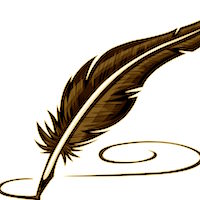
Poets Lineage
Because poets tend to spend most of their time contemplating, experimenting, and wrestling with words; they know more intimately the limitations, seductions, and power of conceptual symbolism – the wisdom beyond words. Often hidden in obscure ambiguity, double entendre, and innuendo; their writings can become a kind of secret language communicating ideas and attitudes normally banned, punished or repressed by political or cultural thought censors. For the same reason, they normally build antibodies protecting them from status quo coercion, blind faith, and belief in their own thoughts. This may explain why our lineage holder lists include so many poets.
People (163)

Huangdi 國語 (The Yellow Emperor)
2698 – 2598 BCE
Taoist patron saint, founder of Chinese civilization
Considered the initiator of Chinese civilization, ancestor of all Han Chinese and patron saint of Taoism, Huangdi is also credited with first establishing a centralized state, inventing the wheel, the magnet, wooden houses, carts, boats, the bow and arrow, astronomy, the calendar, coined money, weaving silk, dying clothes and the first Chinese character writing system. Parts of Lao Tzu’s chapter 6 may have been quoting him. Dreaming of an ideal kingdom, he successfully devoted his reign to establishing a golden age based on wisdom, natural law, and the power of goodness.
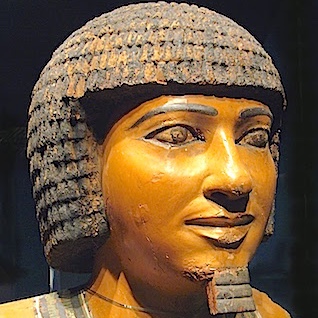
Imhotep
2650 – 2600 BCE
First Western architect, engineer and physician
Considered the first architect, engineer and physician of early Western history, Imhotep invented tools, made great sculptures, and built the first Egyptian pyramids. High Priest, Chancellor, Chief Doctor and Carpenter; he was also revered as a poet and philosopher and was one of the few figures in history born a commoner and deified after his death. "Father of Medicine,” formulator of wise sayings, patron saint of scribes; his legacy and influence helped form the beginnings of ancient Greek culture. His fame continues in modern times disguised in movies, TV shows, comics and video games.
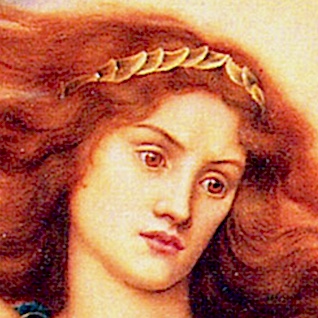
Cassandra
12th C. BCE
Oracle of Crazy Wisdom
Symbol of the wisdom that’s hard to hear or difficult to practice when we do hear it, Cassandra also represents the disastrous consequences of not listening to that wisdom. Like her, many of the lineage holders on this list during their lifetimes were thought crazy, subversive, completely wrong and were only believed and respected much later. She personifies the intuitive, artistic, open approach to life in balance with Apollo’s linear emphasis on clear definitions, order, and superficial understanding of just the words, not the sense. We see both of these principles magnified today in politics and environmental debate, in all our forms of individual and social denial.

Homer
850 BCE - ?
Primogenitor of Western culture
Called by Plato the “first teacher” and "leader of Greek culture,” Homer spread an immense influence over all Western culture. A blind bard prophet, his books the Iliad and Odyssey represent the first European literature as well as one of the main influences that shaped Western culture. The “Greek Bible,” these books taught the best behavior for almost any situation with true and timeless images of human goodness and wisdom. Describing the most enduring legends known to the Western world, these universal themes inspire and enlighten.
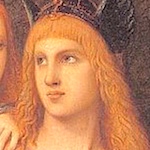
Hesiod
846 – 777 BCE
“History’s first economist”
Called “history’s first economist,” farm hand, singer, epic poet of the people; Hesiod used his poetry to paint and establish religious customs, Greek mythology, good farming practices, and a foundation for the poor to overturn the injustices and inequality of the kings and aristocracy. He protested against injustice, furthered the understanding of astronomy and time keeping, the economics of sea trade, and gave meaningfulness to creativity and hard work. While Homer extolled the hero, the rich and powerful; Hesiod championed the working classes and the common person (though not women).
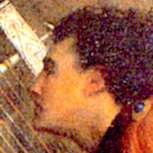
Orpheus /ˈɔːrfiəs
7th century BCE
"Greatest poet and musician of all time"
Accepted by most ancient sources as a real person but also shrouded in myth and legend, Greeks venerated Orpheus as the greatest poet and musician of all time believing his music could charm animals, divert rivers, and even make rocks and trees dance. As prophet, musical archetype, and founder of the Orphic mysteries; his influence on art, poetry, film, opera, music, and painting continues into modern times. As well as influencing Stoic pantheism and the Neo-Platonists’ asceticism; he continued a mystic cult migrated from Egyptian Osiris that included the suffering, death, and resurrection of a divine son; judgments at death of heaven, hell, or purgatory; “original sin,” and a communion sacrament of eating a god’s body and blood; it became a basis for the Christianity flourishing today.
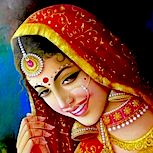
Maitreyi
c. 7th century BCE
Symbol of enlightened feminine principle
A symbol for Indian intellectual women, "one of the most learned and virtuous women of ancient India,” poet, philosopher, and wife of the great sage, Yājñavalkya; Maitreyi studied, debated, taught metaphysics and wrote 10 hymns in the Rigveda, one of the four Hindu canonical sacred texts. Her dialog with Yājñavalkya in an Upanishad formed the foundation for Advaita, the oldest school of Vedanta that teaches and gives practices to help realize non-duality. In this dialog, her challenge to the male guru shows the equality of women in ancient India and inspires that realization today - a college in New Delhi is named after her.
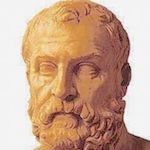
Solon
638 – 558 BCE
Founder of Athenian democracy
Poet, statesman, lawmaker, one of the Seven Sages of Greece and known for establishing the foundations of Athenian democracy; Solon wrote poetry and helped stop the decline in ancient Athens. At that time, not being able to repay a debt meant slavery - first of your children, then your wife, and finally yourself. As much as 92% of all Athenians were slaves. A skilled compromise negotiator, and respected for his wisdom and fairness, Solon was given power to change this. Establishing publicly funded brothels "democratize" the availability of sexual pleasure, he cancelled debts and contracts, freed slaves, and ended the causal system. This along with his beneficial trade legislation and standards resulted in an economic revival, a new golden age, and the beginning of democracy.
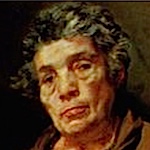
Aesop
620 – 546 BCE
Hero of the oppressed and downtrodden
Known as a strikingly ugly slave who by his cleverness became free and an adviser to kings and city-states, some historians believe Aesop was a black from Ethiopia and became Uncle Remus in the Cherokee, Algonquin and American slave tradition of Br'er Rabbit. In many cultures he symbolizes a hero of the oppressed, disadvantaged and downtrodden who with wisdom and understanding outsmarts and wins over the rich and powerful. Famous throughout the world - from China to Africa, from Europe to Japan, from ancient times until today; Aesop’s fables and sayings remain a profound influence of goodness and insight.

Sappho
612 – 570 BCE
“The Poetess” and most famous Greek woman
The most beautiful singer of her age, a political force when only 19, one of the great “Nine Lyric Poets” of ancient Greece, called by Socrates, “The Beautiful,” by Plato the Tenth Muse, and “the Poetess” by all the Greek world; Sappho is the most famous Greek woman. In fear of her pen, politicians banished her twice and her poetry continued to inflame autocratic leaders for centuries – even Medieval Church leaders in Rome and Constantinople tried to burn all her 9 volumes of poetry in 1073 and remaining scraps of these weren’t found until 1897, some not until 2014. She started history’s first “finishing school” for girls and lived “laughing love’s low laughter… lost in the love trance."

Lao Tzu 老子 (Lǎozǐ)
604 BCE -
The poems translated here say more about Lao Tzu than could any commentary on his life. A huge influence on all of Chinese culture, much of Chinese literature and almost all of Chinese art, Lao Tzu’s teachings also extend to every aspect of life including politics to such an extent that he was claimed as an ancestor by the emperors of the Tang dynasty. Some call Zen “Taoism in Buddhist clothing” and these teachings continue to inspire people in all of the non-thought lineages. As Ursula Le Guin comments, “Of all the deep springs, this is the purest water.”
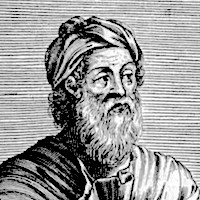
Xenophanes Ξενοφάνης ὁ Κολοφώνιος (Xenophanes of Colophon)
570 – 475 BCE
Nomad, belief-system critic, poet, and highly influential but greatly under-appreciated pre-Socratic Greek philosopher; Xenophanes traveled for 67 years teaching, "making enemies," and challenging traditional Greek values like athleticism and belief in anthropomorphic gods. Plato used many of his ideas in the Republic III, Aristotle deprecated him but then advanced many of his ideas when he wrote Metaphysics. Xenophanes realized early how stuck to tradition most contemporaries become and consciously wrote for future generations he believed (correctly) would be more open to his ideas.
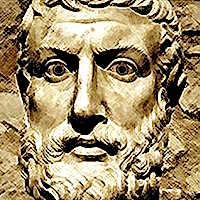
Parmenides
540 – 450 BCE
Grandfather of Western philosophy
Parmenides of Elea Παρμενίδης ὁ Ἐλεάτης (c. 540 - 450 BCE)
Father of Western logic, grandfather of Western philosophy, major influence on the development of science, promoter of the most paradoxical (contrary to appearances) vision of reality, and venerated by Plato and Aristotle; Parmenides taught that our experiences of “reality” are illusory, that the profound oneness of life makes change impossible, existence timeless, and that nothing either dies or is born. In The Way of Opinion, he explains the world of appearances, in which one's sensory faculties lead to conceptions which are false and deceitful. In The Way of Truth, he describes a mystical experience of absolute, unborn reality. These categories parallel our theme of “the words or the sense.”
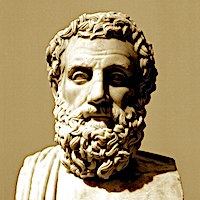
Aeschylus Αἰσχύλος
525 – 455 BCE
The Father of Tragedy
Although Aeschylus was the first to present plays as trilogies, the initiator of many theatrical innovations, and the “father of tragedy;” his Greek epitaph didn’t mention his plays, only his military roles. Although not fully acknowledged in ancient Greece, his influence has seeped through history and into the present as an inspiration for Wagner, Milton, the Romantics, Eugene O’Neill, and Robert F. Kennedy who claimed him as his favorite poet who he quoted in a speech to African Americans after Martin Luther King’s assassination. This same quote—“to tame the savageness of man and make gentle the life of this world”— became inscribed on Kennedy’s memorial after his own assassination. Aeschylus’ costumes and performances were so vivid that they were said to cause children to faint, men to urinate in their robes, and pregnant women to go into labo
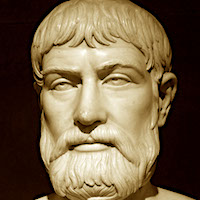
Pindar Πίνδαρος
522 – 443 BCE
Archetype of poetry
One of the always-praised but almost never-read writers, Pindar wasn’t even popular during his lifetime though he was sought out and paid high sums for eulogies. Although only a small fragment of his odes remain and none of his music and dance displays; enough of the creative artistry and complex, beautiful structures survive to give Pindar an immortal place in world literature. He became popular again during the Byzantine Era and again when his style was emulated for the revived 1896 Olympic Games, the Athens Olympics in 2004, and the London Olympics in 2012. Horace thought anyone trying to imitate Pindar would be like Icarus, sure to fail. The splendor of his imagery, imagination, and style have brought some modern scholars to regard his work as “an archetype of poetry.”
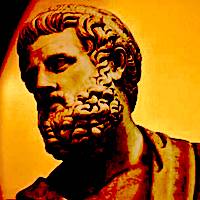
Sophocles Σοφοκλῆς
497 – 405 BCE
“The Wise and Honored One”
Author of 120 plays, known as “The Wise and Honored One,” most popular Athenian playwright for 50 years, champion wrestler, poet, musician, actor, politician, general, and priest; Sophocles initiated pioneering innovation in the presentation of drama including an emphasis on inner, psychological character development. Strikingly handsome, athletic, enriched and privileged by his family’s wealth from selling weapons during the Persian wars; Sophocles ironically developed a dark pessimistic fatalism. He ranked the unborn as the most blessed and those who die at birth next. His play, Oedipus Tyrannus became the most famous of all Greek dramas. Brought to court by a son fearful that he would bequeath his wealth to an illegitimate son from a prostitute, Sophocles defended himself by reading from a play. This not only won the case but garnered the honor of the judges escorting him home.
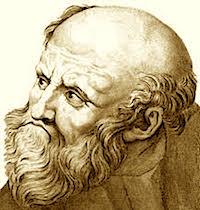
Empedocles
490 – 430 BCE
"The father of rhetoric"—Aristotle
Empedocles Ἐμπεδοκλῆς (490 – 430 BCE)
Brilliant orator, physician, poet, vegetarian, magician, pre-Socratic Greek philosopher, and called by Aristotle the father of rhetoric; Empedocles, according to Kingsley, “brought the germs of a new civilization into existence” and became a foundational researcher who set the stage for Euclid and the other early scientists. Also a highly successful politician who helped over through tyrannical and oligarchic governments but then declined offered sovereignty, he was the last Greek philosopher to write in verse. First in the west to describe the four classical elements, he taught the first comprehensive theory of light and vision, anticipated Darwin's theory of natural selection, and believed that all living things reincarnate between humans, animals and plants. Said by Pliny to have traveled to the east and studied with the Magi, Empedocles explained how limited and narrow our perceptions remain while our concepts fool us into believing we understand the whole, how we believe the words without insight into the sense.
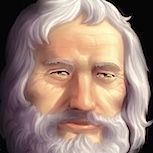
Euripides
480 – 406 BCE
Ancient humanitarian influence continuing today
Radical influence for the good, for equality, compassion, and understanding; Euripides became the best playwright of all time actively fighting against oppression, inequality, superstition, and war. He depicted the gods of his time as childish fantasies, women as the best civilizing force for men, ancient heroes as ordinary people, and sympathy as the best attitude toward all victims of war and social inequalities. Frequently shocking the status quo, he became the foundation for ancient education and the greatest ancient intellectual Greek inspiration, a force that continued through history, inspired the 18th and 19th century humanitarianism, and continues today.
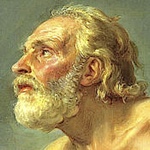
Diogenes (of Sinope)
412 – 323 BCE
Exiled from his place of birth, Diogenes lived as a citizen of the world begging for food and sleeping in a big ceramic jar. Carrying a lamp during the day “looking for an honest man,” he publicly ridiculed Alexander the Great, sabotaged and embarrassed Plato, and was sold into slavery after being captured by pirates. He developed Cynicism and teachings that became Stoicism, one of the most influential philosophies of Greek culture. He criticized the artificialities of society and advocated simplicity and a return to nature. Referencing him in their works, he inspired many great literary figures including Chekhov, Blake, Goethe, Dostoevsky, Cervantes, Charlotte Brontë and Charles Dickens. Called by Plato ”Socrates gone mad,” his poetic spirit and lifestyle continued through the ages, manifested in modern times by people like Charles Bukowski, and embodied in stories like Jack Kerouac’s On the Road.
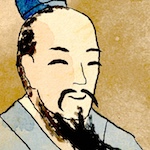
Chuang Tzu 莊周 (Zhuangzi)
369 – 286 BCE
In a very real way, all of Chuang Tzu’s writings are a commentary on the Tao Te Ching. And by far, the best. Many consider him to be like Plato was to Socrates, like Paul was to Jesus, like Mencius was to Confucius, like Ashoka was to the Buddha… responsible for spreading the message of their teacher to the bigger world. Ridiculing rigid Confucian principles, he champions the sense instead of the words, the non-thought lineage, and true wisdom in daily life. His teachings emphasizing the interdependence of all things both inspire and foreshadow our modern ecological perspective.
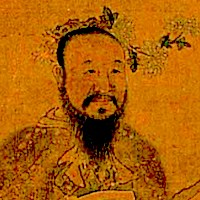
Qu Yuan 屈原 (Qū Yuán)
340 – 278 BCE
"King of the Water Immortals"
Patriotic poet, politician, Chu royal clan official, and inspiration for China's Dragon Boat Festival; Qu Yuan wrote at least some of the Chu Ci (Songs of the South) poems—one of China's two most famous ancient collections. Slandered and exiled by corrupt officials while helping King Huai, the same thing happened while advising King Qingxiang causing him to spend his time collecting folk tales and legends while writing some of China's greatest poetry. In a deep depression from his exiles as well as the Qin State's conquering of his country's capital, he committed suicide as a way of protecting his integrity. Mao tried to replace Confucius with Qu Yuan as a cultural hero.
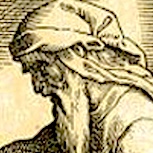
Koheleth
c. 330–180 BCE
Author of the most mystical, the most in harmony with the non-thought lineage part of the Bible, Koheleth anonymously wrote Ecclesiastes, part of the Hebrew Bible as well as one of the “canonical Wisdom Books” recognized by most Christian denominations. It focuses on the meaning of life, the best way to live, the futility of materialism and wisdom as the highest value. Thomas Wolfe called it “the noblest, the wisest, and the most powerful expression of man's life upon this earth—and also the highest flower of poetry, eloquence, and truth.” Koheleth himself remained anonymous and obscure, not taking credit for this great work.
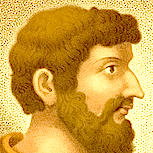
Callimachus Καλλίμαχος
310 – 240 BCE
Apostle of creativity and individuality, Callimachus suggested we "abhor all common things.” Descended from the first Greek Royal family that reigned in Africa, he was one of the first critic-poets and led the trend of rejecting the Homeric epic style in favor of epigrams and short poems. A major influence on Ovid and Latin poetry in general, he invented for libraries what may have been the first bibliographical survey that listed, categorized, and identified where literary works could be found. Teacher to Eratosthenes, he wrote one of the earliest love stories in all literature with a theme since retold by millions of poets and novelists.
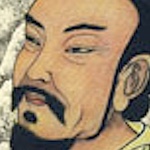
Liú Ān 劉安 (Huainanzi)
c. 179–122 BCE
Grandson of the Han Dynasty founding emperor and known as both an enlightened immortal and by his detractors as a rebel, Liu An sponsored “The Eight Immortals of Huainan” who together with him wrote the Huainanzi, a famous text that along with the works of Laozi and Zhuangzi is considered a cornerstone of Daoist philosophy. It describes how to perfect the best socio-political order and is still used as a handbook on how to train enlightened leaders. Also known as a great poet, Liu An’s fame includes being the first to record the famous Taoist Farmer Story, the first to experiment with hot air balloons as well as inventing tofu and soy milk.
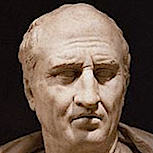
Philodemus Φιλόδημος (of Gadara)
110 – 35 BCE
Innovative philosopher-poet, student of Epicures and Zeno, first generation Epicurean, praised by Cicero, and a big influence on Horace; Philodemus was originally most well known for his poetry. However since 1738 when the ancient papyrus scrolls of Herculaneum were discovered under lava flows from Mt. Vesuvius that also destroyed Pompeii and with the help of x-rays and computers in recent years, his influence was discovered to extend to music, history, ethics and theology.
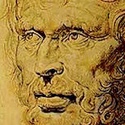
Lucretius (Titus Carus)
99 – 55 BCE
The greatest Western philosophical poet, a complete evolutionist, writer of the “loftiest poetry that any age has known” and the “most marvelous performance in all antique literature” (Durant); Lucretius described religion, the universe, and medicine from a rational point of view without superstition, faith, or dogma. An Epicurean with allegiance to only Venus and the power of love, he left behind all other gods and proposed a scientific understanding of the world including atomic theory and evolution. A huge influence on ancient times, people like Virgil and Horace; he also inspired Enlightenment era people, humanism, Thomas Jefferson and modern psychology.
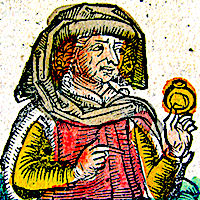
Ovid oʊvɪd (Publius Ovidius Naso)
43 BCE – 18 CE
Great poet and major influence on the Renaissance, Humanism, and world literature
Roman poet, inspiration for Renaissance humanism, consummate love elegist, and a tremendous influence on both Western literature and art; Ovid was staggeringly popular during his own time, during the Middle Ages, during the Renaissance, and still in our own time today. Fashioning himself as a love doctor, he wrote a 3-volume treatise called The Art of Love complete with instructional images and poetry about oral sex pleasure. It begins with teaching men how to best find a lover, seduce them, and later hide affairs. It continues with advice for women on how to avoid the traps and deceptions he has taught men. This also became immensely popular but his popularity didn’t serve him well politically. Emperor Augustus exiled him to a remote, harsh location where his friends avoided him and he remained until he died 9 years later.

Jianzhi Sengcan 鑑智僧璨 (Jiànzhì Sēngcàn)
529 – 606 CE
The Third Chinese Patriarch after Bodhidharma and thirtieth Patriarch after the Buddha, Sengcan wrote famous Chinese poems called Xinxin Ming. Because of a Buddhist persecution of the time, he went into hiding in the mountains and later wandered without a home for 10 years. He taught the elimination of all duality, going beyond words to the sense, and the contemplation of wisdom. Hsin Hsin Ming
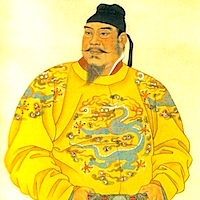
Taizong of Tang 唐太宗 唐太宗 (Li Shimin)
598 – 649 CE
One of China’s greatest emperors, co-founder of the Tang Dynasty which became the world’s most civilized power, and architect of a golden age—China’s most creative period; Taizong’s reign became the standard and measure for all future leaders. A scientific and Confucian scholar, he began by killing his brothers and expanding the empire but soon devoted himself to increasing peace and prosperity. Without personal dogma and prejudice, he welcomed Buddhist monks, Nestorian Christians, Zoroastrians, and made the capital so beautiful that it attracted hordes of tourists from as far away as India and Europe. He wrote a book reconciling Buddhism and Taoism, another one on government that became a popular reference for leaders in many different countries, promoted the arts, and it was said of people during that time, “whoever was a man, was poet.” Over 1000 years later, a Manchu emperor commissioned an anthology of Tang poems that included 48,900 poems by 2,300 poets.
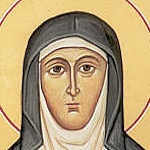
Hilda of Whitby
614 – 680 CE
Living in a brutal time of violent warlords and kings, Hilda’s mother was a poor, homeless widow. From this humble and challenging beginning, she became a powerful advisor to officials, bishops, and kings. The historian Bede wrote, “All who knew her called her mother because of her outstanding devotion and grace.” Abbess and founder of several monasteries, five men who lived and studied at one of these became bishops and two of them are now revered as saints. She is considered a patron saint of poetry, learning and culture.
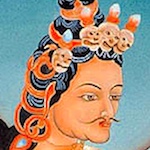
Saraha
8th century CE
Earliest Mahasiddha, founding father of the Buddhist Vajrayana and Mahamudra tradition; Saraha was expelled from a monastery for drinking alcohol, found a young low caste bride, became a maker of arrows, and went on to write the main Mahamudra meditation text and become a great yogi and master song writer. Like Lao Tzu, he followed the same “Inborn Natural Way” and began the lineage which descended through time to Tilopa, Naropa, Marpa, Milareapa and now to the Gyalwang Karmapa.

Li Bai 李白 (Li Bo)
701 – 762 CE
The greatest Chinese poet so widely respected that a crater on the planet Mercury was named after him, that he would appear as a character in books written by Hermann Hesse, John Steinbeck, Guy Gabriel Kay, Simon Elegant, Ursula Le Guin, and Philip K. Dick.. Immensely influential during his own time as well as subsequent generations in China, his influence extends to American Imagist and Modernist poetry through poets like Ezra Pound, Charles Bukowski, and Derek Walcott. Mastering Confucius at 10, he began writing poetry still famous today. At 12 he went to live in the mountains studying and writing, returned and wandered, married but but didn't make enough money so his wife left with their children. He became a favorite of the emperor, was rejected, wandered again, was imprisoned, sentenced to death, released to wander again, and legended to drunkenly die in a river while trying to embrace the moon's reflection.
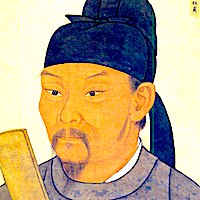
Du Fu 杜甫 杜甫
712 – 770 CE
Though Li Bai in the West is most often considered China's greatest poet, in the East, that honor most often falls to Du Fu, "the Chinese Shakespeare." Historian, sage, and compared to Milton, Burns, and Wordsworth; Du Fu failed the Chinese examinations for public office although the subject was poetry but became one of China's most influential writers. A close friend and traveling companion of Li Bai during a time of intense political change, his fortunes rose and fell from the highest honors to the depths of misery finally to be robbed of the straw in his bed while he was too weak to resist. In Japan considered the "Saint of Poetry" and the major influence on the greatest haiku poet, Matsuo Bashō; Du Fu excelled at reconciling opposites, considered "everything in this world is poetry," and became one of the greatest writers in any language.
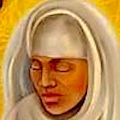
Rabia Basri رابعة العدوية القيسية (Rābi‘a al-‘Adawīyya)
714 – 801 CE
Muslim mystic, “queen of saintly women,” and most important early Sufi poet; Rabia Basri rose from the poverty and slavery of her youth to become the most famous and influential Sufi woman of Islamic history known as “the queen of saintly women.” She had many disciples and became an important influence on the leaders of her time as well as an early voice against spiritual materialism and Islamic patriarchy. She taught a doctrin of Divine Love known as Ishq-e-Haqeeqi that is still practiced today and emphasized spiritual practice without desire for reward or fear of punishment.

Han Shan (Cold Mountain)
c. 730-850 CE
Claimed by Buddhists as a Buddhist, by Taoists as a Taoist; Han Shan poked fun at both and living beyond any narrow categories like these, through his poems communicated a universal wisdom and truth. Not attached or attracted to honor and gain, he laughed at offered high positions and wealth. The favorite poet of everyone from Wang Anshi (1021-1086), one of China’s most famous prime ministers to Jack Kerouac who in 1958 dedicated his book Dharma Bums to him, Han Shan’s poems express complete spontaneity, total indifference to praise and blame, and continual realization of pure consciousness in the simple, ordinary details of life.
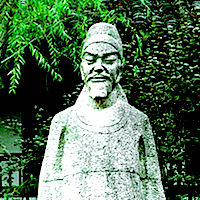
Liú Yǔxī 刘禹锡
772 – 842 CE
"Mad old man poet," politician, and philosopher
Poet, philosopher, writer; Liu Yuxi grew up in the political chaos of the time and transitioned from tutor to an heir apparent, secretary to a military governor, a high political post of Investigating Censor, to friend of many literary giants of the Tang Dynasty. He was banished, recalled, banished again because of a satirical poem, then made a provincial governor, and later governor of Suzhou. Along with famous poet/governor Bai Juyi he was known as one of the “two mad old men.” His poetry became some of the most famous throughout China, the other East Asian countries, and now—through insightful translations like Red Pine’s—in the West as well.

Ziryab أبو الحسن علي ابن نافع, زریاب (Abu l-Hasan, “Blackbird”)
789 – 857 CE
Singer, poet, polymath, freed slave, teacher, and one of the greatest influences on world culture; Ziryab’s name is almost unknown in most of the world although the traditions and styles he initiated are commonplace. He invented and popularized the early form of toothpaste, the three-course meal, asparagus, the use of tablecloths, wearing hair in bangs, and using glass containers for drinks. Founder of the 500-year Andalusian music tradition, he laid the early groundwork for classic Spanish music, revolutionized the musical instrument design that became the lute, and created a musical style that influenced European minstrels, troubadours, and the course of European music.

Lü Dongbin 呂洞賓 (Lü Tung-Pin)
796 CE -
Scholar and poet, de facto leader of the 8 Immortals, founder of the School of the Golden Elixir of Life and the internal alchemy tradition; Lu Dongbin is named in famous Chinese proverbs and wrote the Secret of the Golden Flower. An easy-to-anger, prolific poet and ladies man prone to bouts of drunkenness; he’s considered an emanation of the Bodhisattva Guanyin (Avalokiteśvara) dedicated to helping people realize wisdom and learn the Tao. Continually popular in folklore, he was portrayed by Jackie Chan in the movie The Forbidden Kingdom.
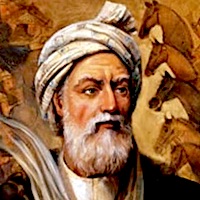
Ferdowsi فردوسی (Abul-Qâsem Ferdowsi Tusi)
940 – 1020 CE
"undisputed giant of Persian literature"
Philosopher, poet, and one of the world's most influential literary figures; Ferdowsi wrote what became Iran's national epic as well as history's longest poem written by a single poet. Considered the "father of the modern Persian language," he influenced all the writers who followed him, regenerated the Persian language, and revived many cultural traditions.
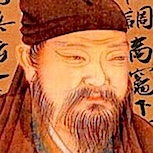
Wang Anshi 王安石
1021 – 1086 CE
Poet, economist, statesman, and one of China’s most famous prime ministers during a time of rampant nepotism and an extreme imbalance between the rich and the poor; Wang initiated major reforms to break up monopolies, expand the civil service examination system, increase currency, and begin social welfare programs to “prevent the working classes from being ground into dust by the rich.” Although removed from power and imprisoned by political rivals, his reforms still ripple through Chinese history. He started public orphanages and hospitals, set up price and wage controls, pension funds for the old, poor, and unemployed — all while writing commentaries on Lao Tzu and some of China’s most famous poems.
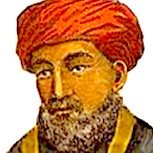
Solomon ibn Gabirol שלמה בן יהודה אבן גבירול (Avicebron)
1021 – 1070 CE
The greatest poet of his age, a Jew for over 600 years regarded by Moslems as a Muslim and by Christians as a Christian, believed a Christian by William of Auvergne who called him “the noblest of all philosophers;” Gabirol grew up in hardship and wandered for years in such poverty that “a fly could now bear me up with ease.” A huge influence on both Christianity and Islam, he championed reason over faith, compiled a book of proverbs independent from Judaism that included wisdom sayings from China, and wrote one of the greatest poems in all of Hebrew literature.
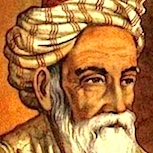
Omar Khayyám
1048 – 1131 CE
Persian Astronomer-Poet, prophet of the here and now
In the west most famous for his poems but Omar Khayyam was also a political advisor, “philosopher of the world,” one of the most influential scientists of his era, “one of the greatest mathematicians of medieval times,” and “without equal in astronomy and philosophy.” A prophet of the here and now, mystical Sufi teacher and free-thinker who rejected theology; he reformed the Persian calendar to a form more accurate than our own today, wrote the most important until modern times book on algebra as well as many others on astronomy, geography, and mechanics. His poems—known as the Rubáiyát—not only rejected Islamic belief and Christian morality, but the nature of religion itself.
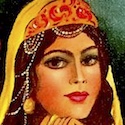
Arwa al-Sulayhi (Al-Malika al-Ḥurra)
1048 – 1138 CE
The stellar example in Muslim history of an independent queen; Arwa ruled Yemen, was the greatest leader during the Sulayhid Dynasty, and was - for the first time in the entire history of Islam - a woman given the title of hujja, the highest status in Islam. Extremely beautiful, intelligent, scholarly, brave, and powerful; she studied science, poetry, history, completed practical and beneficial infrastructure projects, supported agriculture, and built many schools. Her direct lineage continues today in both Yemen and India.
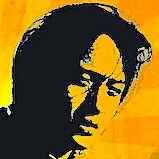
Milarepa རྗེ་བཙུན་མི་ལ་རས་པ།
1052 – 1135 CE
Black magician enemy-killing sorcerer transformed into a great Tibetan folk hero, poet, singer-songwriter and saint; Milarepa always refuted any hero worship or deification stressing his humble background and realization that anyone could achieve. Overcoming powerful, psychological demons, he left far behind fame, fortune, pleasure, power, even companionship and after many years of solitary meditation wandered throughout Tibet teaching and leading students to illuminating, egoless, complete sanity beyond the corruptions of a belief in a separate self. Profound without pretense, ageless because authentic, livable because so simple; Milarepa’s teaching and inspiration continues.

Hildegard of Bingen
1098 – 1179 CE
Circumventing her times’ strong prejudice and bans against women's social, artistic and theological participation, Hildegard became a famous writer, composer, botanist, philosopher, visionary, Christian mystic and the founder of scientific natural history in Germany. The first Westerner credited with describing the healing powers of food and corresponding with the political, religious, and scientific leaders of her day (popes, emperors, saints and scientists), she used her influence to combat corruption, promote spiritual insight, holistic healing, the arts, and women’s role in the world
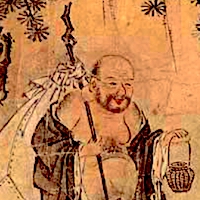
Kakuan Shien 廓庵師遠 (Kuo-an Shih-yuan, Kuòān Shīyuǎn )
1100 – 1200 CE
Most popular Ten Bulls artist/poet
Chan Buddhist monk, artist, and poet; Kakuan expanded on an old Taoist story that used an ox and herding as symbols for the spiritual path. He added two new pictures to a previous version that had 8 and published his new verses and pictures in c, 1178. These new additions emphasized returning to the world and linking closely realization with everyday life. Dramatically symbolizing the path to enlightenment, his rendition became the most popular then and continues to hold that position today in spite of many newer attempts. Exemplifying the close connection between Taoism and Zen, his Ten Bulls became closely identified with Zen in general as well as a continual source of inspiration for students.
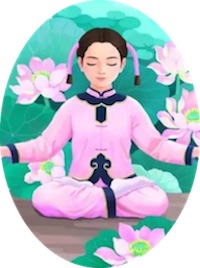
Sun Bu'er
1119 – 1182 CE
Sun Bu'er 孫不二 (1119 – 1182)
Taoist priestess, one of the Seven Masters of Quanzhen, mother of 3, beautiful, intelligent, wealthy, and known as “Clear and Calm Free Human;” Sun Bu'er founded the Purity and Tranquility School and wrote many famous poems and secret Taoist texts. She developed a “science of essence” concerned with psychologically going beyond the influence of both inherited personality and learned conditioning as well as a “science of life” developing ways to increase health and energy. Destroying her beauty to prevent male attack, she became the only woman included in the famous Taoist “Seven Perfected,” and through the ages a role model and inspiration for women following a spiritual path.

Ibn' Arabi Ibn 'Arabi
1165 – 1240 CE
“the foremost spiritual leader in Muslim history”
Islamic Scholar, Sufi mystic, poet, philosopher and genuine saint; Ibn ‘Arabi was born during and at the center of a time and place where Christian, Jewish, and Islamic thought were cross-pollinating with a rediscovery of ancient Greek and Roman wisdom. In over 350 literary works including some of the finest poetry in the Arabic language, he influenced Islam away from rigid orthodoxy toward a universal understanding that appreciates each person’s unique and personal spiritual path above doctrine and belief. A polarizing figure in Muslim culture, he’s known as either “the foremost spiritual leader and Sufi master in Muslim history” or as a heretic and apostate.

Dōgen Zenji 道元禅師
1200 – 1253 CE
Illegitimate son of a Japanese noble, Dōgen became a famous poet, writer, philosopher, and founder of the Sōtō school of Zen. Dissatisfied with the spiritual materialism of Buddhist teaching and teachers in Japan, he traveled to China seeking a more authentic Way. After training there for many years he returned, taught a meditation practice called zazen, and wrote the first Japanese monastic code. His deep understanding and powerful use of language helped bring realization to many and continues today.

Rumi مولانا جلالالدین محمد بلخی (Rumi Mawlānā Jalāl ad-Dīn Muḥammad Balkhī)
1207 – 1283 CE
Sufi mystic, Afghan hero, Sunni scholar-theologian, and one of the most widely read poets in the United States; Rumi went beyond religious, cultural, and ethnic borders to become a bridge between Shia and Sunni Muslims, East and West, between many of the world’s religions and cultures. Always a strong voice for peace, harmony, and understanding; he composed what’s considered the greatest poem written in the Persian language. While fleeing from a Mongol invasion with his family and during later journeys, he encountered many poetic and spiritual influences that transformed his conventional life of a scholar and jurist into an ascetic teacher who used music, poetry and dance to communicate the highest wisdom.
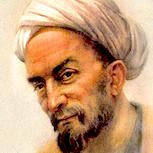
Saadi Shiraz سعدی شیرازی
1210 – 1292 CE
One of the greatest Persian poets and literary influences in medieval times and an influence on the West through people like Goethe, Hegel, Pushkin, and Barack Obama; Saadi - with a Zen-like approach similar to the great Tibetan teacher, Marpa - blended a mystical Sufi realization with a practical traveling merchant lifestyle. Escaping the hardship and poverty of his Baghdad youth, he traveled widely for 30 years including 7 years of imprisonment enslaved to hard labor. He then wandered 20 more years during the Mongol invasions mingling with ordinary people, bandits, refugees, spiritual teachers and farmers translating their experiences into poetry and wisdom teachings.
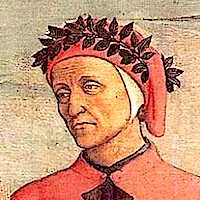
Dante (Durante degli Alighieri)
1265 – 1321 CE
Dante fell madly in love with Beatrice when she was only 8 years old and described his passion as “a God stronger than I who came and ruled me.” This unrequited love lasted through her marriage to another, her death at only 24, and throughout Dante’s life. It inspired his great work, The Divine Comedy now considered the greatest book in the Italian language and most important Middle Ages poem. Dante’s politics led to his exile, loss of citizenship and property, 15 years of poverty-stricken wandering, and a decree for him to be arrested and burned alive. His vivid descriptions of hell were based on personal experience and his writings saved him from the intensity of his suffering as it helped establish modern literature. Florence apologized for his exile 700 years later.
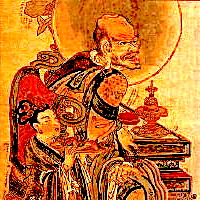
Yoshida Kenkō 兼好
1284 – 1350 CE
Inspiration of self-reinvention
After a life working as an officer of the guards in the Imperial palace, Kenko became a monk and one of the most famous authors of his era. His speculations on universal themes like beauty, nature, impermanence, and friendship found a deep resonance of feeling during his own time, one that continued fresh through the time since, and one remains part of Japanese school curriculum today. A paragon demonstrating the ever-present possibilities of re-inventing ourselves, Kenko’s transformation from a menial worker into an insightful sage became an inspiration in itself, beyond the wisdom in his essays and poems themselves.
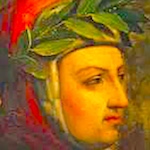
Petrarch
1304 – 1374 CE
The “Father of Humanism,” troubadour of romantic love, lover of nature, “Virgil born again,” the most famous unrequited lover, and most important poet of his age; Petrarch inspired an interest in ancient history and as “the first tourist” discovered and translated many old manuscripts including Cicero’s letters that sparked the 14th-century Renaissance. Holding the sense over the words, he challenged orthodoxy and invented new Latin terms to describe Greek philosophy, developed the concept of an historical “Dark Age” after the fall of Rome, a need for a cultural revival, inspired the political, military, and religious leaders of his time to ground their lives in classical values and contemplation. and his sonnets became a model for lyrical poetry through modern times.
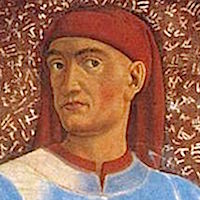
Giovanni Boccaccio dʒoˈvanni bokˈkattʃo
1313 – 1375 CE
Close student, friend and collaborator with the “Father of the Renaissance,” Petrarch; Boccaccio became a popular poet/writer, “the first Greek humanist in Western Europe,” and promoted the ancient literature, philosophy, and history which set the stage for the Renaissance. His book on classical mythology became a key reference for 400+ years and challenged Christian belief that only the Bible was relevant, that there was only harm in “pagan” writings. In an early nod to feminist proposition, he wrote the first collection devoted to the biographies of famous women. Living through a tumultuous time of political intrigue, the executions of his friends, bitter poverty and bad health; he resisted many of the era’s superstitious and setting-sun forces; translated works by Homer, Euripides, and Aristotle; and helped launch one of history’s most influential shifts, the Renaissance.
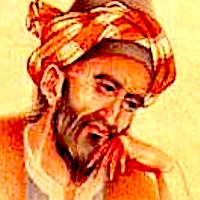
Hafiz خواجه شمسالدین محمد حافظ شیرازی (Hafez, Shams-ud-Dīn Muḥammad)
1315 – 1394 CE
Inspiring friend to the true and free human spirit
Mystic poet, “tongue of the invisible,” living oracle, “a poet for poets,” one of the world’s best spiritual friends and guides; Hafiz wrote poems that dissolve the walls separating people from each other, from nature, and from sacred awareness. For centuries readers in the Persian world have used him as a kind of I Ching or astrology to find practical, personal, and wise advice for the quandaries of daily life. Even Queen Victoria is rumored to have used his poems in this way. Although a Sufi in the Islamic traditions, Hafiz obviously goes far beyond and kind of sectarian fixation and exposes a true realization of universal truth, the perennial philosophy, and authentic, sacred-world living.
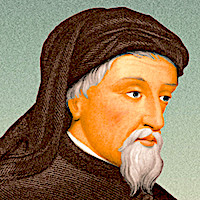
Geoffrey Chaucer
1343 – 1400 CE
“Father of English literature”
Scientist, philosopher, diplomat, “Father of English literature,” and greatest Middle Ages English poet; Chaucer transitioned literature in French and Latin to an English for the English-speaking. Also a page, bureaucrat, soldier, messenger, administrator, and valet; he portrayed and spoke for the common person. This support for the populace however created a backlash from the monarchy and he was fined and imprisoned. Claimed by the Protestant movement as an early forefather, he tried to separate religion from superstition, was rumored to have beaten up a Franciscan Friar on a public street, and supported religious reform.
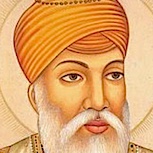
Kabīr कबीर
1399 – 1448 CE
Formidable iconoclast and deeply spiritual but anti-religious leader, a simple weaver but greatest poet of his time and place; Kabīr was born and raised as a Muslim, studied with a Hindu guru, became critical of both traditions, was physically threatened by both and after he died revered and claimed by both. From his background of a Muslim father and Hindu mother, he worked tirelessly to unite both traditions with a wisdom beyond their sectarian views. An important influence on Guru Nanak and the founding of Sikhism, his poetry and wisdom continue today in mainstream Indian film, folk songs, and even progressive rock.
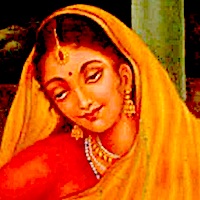
Meera (Mirabai, Meera Bai )
1498 – 1546 CE
Inspiring poet, cultural freedom inspiration
Royal family princess, mystical poet, Bhakti movement saint; Meera’s deep devotion expressed in public dancing and singing aroused strong opposition, rejection, and assassination attempts from the Royal Family. Dedicated to a formless divinity, she wrote countless devotional poems called bhajans that became and remain popular on temples across India. Her devotion and courage inspired folk tales, legends, poets, and now popular literature, comic strips, and movies. Her life became a symbol for the common people’s suffering and inspirations for creating a better world as well as for women struggling in an environment trying to force them into role-based boxes. Also one of 16 Sikh bhakti saints, she became a symbol of freedom and following a personal path of inspiration rather than bowing to social, family, and political pressures of conformity.

Gaspara Stampa
1523 – 1554 CE
Unrecognized during her life with only 4 of her more than 300 sonnets and poems published, Gaspara is now considered one of the best 16th century lyricists and greatest Italian woman poet of any time. From a merchant class and not nobility like the other poets of her time, she didn’t let her humble origin and lack of credentials stop her from writing some of the most memorable works of her era. Also a wonderful singer and lute player, she transformed the pain of unrequited love into inspired artistic creation that became a milestone in women's literature and a huge inspiration for Rainer Maria Rilke and many others.
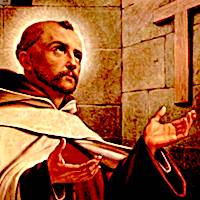
John of the Cross
1542 – 1591 CE
Mystic, religious poet, major Counter-Reformation influence, and Roman Catholic saint; John of the Cross became one of the best Spanish writers of all times. While imprisoned and tortured by conservative Carmelites opposed to reform, he wrote one of his most famous poems (Spiritual Canticle) on scraps of paper secretly given to him by his jailer. After a dramatic escape, he became a friend, supporter and confessor of Teresa of Ávila and founded the first monastery of friars following her principles. In the Christian mystical tradition of the Desert Fathers, Plotinus, and Meister Eckhart; he taught a perspective above sectarian in-fighting, rigid dogmatic views, and unthinking allegiance.

Deqing (Te-Ch’ing)
1546 – 1623 CE
A leading Buddhist monk and poet during the Ming Dynasty, Deqing had a big influence on the Wanli Emperor but was caught in the middle of political conflict between the emperor and his mother as well as tensions between powerful Daoists and Buddhists. In 1595 he was put on trial, imprisoned, and later exiled. His monastery (one of the largest Buddhist centers in China) was burned to the ground. Pardoned after 20 years, he resumed his wandering, teaching, and altruism. Regarded as one of the great reformers of Chinese Buddhism during the later Ming Dynasty, he was renowned and admired as poet, teacher and commentator. Lao-tzu tao-te ching-chieh, Red Pine
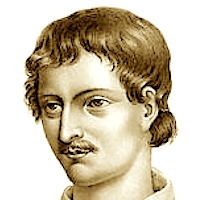
Giordano Bruno
1548 – 1600 CE
Giordano Bruno (1548 – 1600)
Like Galileo, a "martyr of science," Dominican friar, Epicurean poet, cosmological mathematician; Bruno fled his monastery and wandered through France and Italy teaching. Burned at the stake by the Roman Inquisition for his scientific, pantheistic, and Epicurean views; Bruno first described stars as distant suns with planets of their own, championed the Copernican view that the earth is not the center of the universe, and taught the dangerous view that likewise people and our civilizations are not the center of the cosmos but only a tiny part of something much larger. This led to an 8-year trial, his torture and death but also a strong foundation for the newly emerging sciences and the openness to free thought.
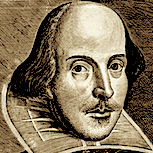
William Shakespeare
1564 – 1616 CE
The greatest writer in the English language whose works - 400 years after his death - have been translated into every living language and remain popular, respected, studied, and performed throughout the world; Shakespeare was as Ben Johnson wrote, "not of an age, but for all time.” When 18 years old, he had his first child 6 months after getting married and before long became a playwright and actor in his own and others’ plays. Unlike many of the prime movers on our biography lists, Shakespeare, though not revered, was successful during his lifetime (as a businessman) and by the time he was 33 while living in London owned the second largest home in Stratford. His influence not only revolutionized drama, scholars link more than 20,000 pieces of music to his writings, many famous paintings, his language helped shape modern English and common everyday phrases, Sigmund Freud drew heavily on him while developing his psychology theories, and Durant describes his influence as moving us to the depths of our spirit.
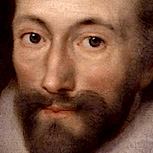
John Donne
1572 – 1631 CE
Leading and inventive metaphysical poet, cleric, politician, womanizer, and one of the greatest love poets; John Donne brought a distinctive style filled with paradoxes and ironies to poems ranging in topic from deeply religious to vibrantly erotic. Fired and imprisoned because of a secret marriage, he lived in poverty for many years while devoting his attention to the idea of “true religion” beyond the superficiality of undigested concepts and superstitious belief. A strong influence on W. B. Yeats, Hemingway, T. S. Eliot, Dylan Thomas, Coleridge, W. H. Auden, Van Morrison, Robert Oppenheimer; his impact continues today with examples like the movie The Incredibles, that took its Nomanisan Island from his famous saying, "No man is an island.”
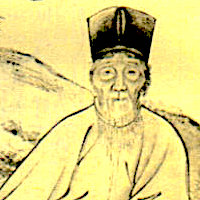
Sun Qifeng 孫奇逢
1583 – 1675 CE
孫奇逢 (1583–1675)
Professor, poet, respected scholar who passed the imperial exams at only 13 years old, and one of the most famous masters of Confucian ethics; Sun Qifeng helped China transition from the Ming to the Ching dynasties. Critical of the Ming control by eunuchs, he followed the neo-Confucian philosophy but emphasized its practicality, the concept of basic goodness, and the importance of nourishing goodness. Often invited to take prestigious governmental offices, he refused preferring a quite life of study. A precursor of—and inspiration for?—Arnold Toynbee, he looked at the rise and fall of dynasties (as well as individual success and failure) through the lens of the I Ching and left a treasury of books including popular commentaries on the Four Books, biographies of 11 famous, Confucian masters, and the history of 146 philosophers and their teachings.
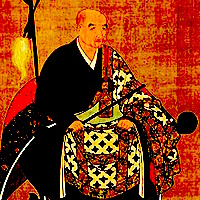
Bunan 至道無難 (Shido Bunan Zenji Munan)
1603 – 1676 CE
When young and known as the “Kana-writing boy” because of his skills, Bunan started practicing Zen and became a married innkeeper but also an addicted gambler and alcoholic. A chance encounter with a teacher, Gudo led to a radical life change, his enlightenment, and a recognition of the corruption that had entered the Rinzai Zen tradition. He became a famous poet, the teacher of Shoju Etan, teacher to Hakuin who revitalized Japanese Zen, and started many of the modern lines of Zen masters. Bunan eschewed fame and fortune, conventionality, rules, and following the words of the teaching rather than the sense.
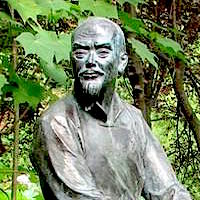
Lǐ Yú 李漁 (Li Liweng)
1610 – 1680 CE
“Artist of Living, playwright, actor, director, poet, novelist and "writer-entrepreneur;” Li Yu dropped out of the imperial exam process and instead of becoming an official traveled through China with his own acting troupe writing plays, acting and directing. A daring and creative writer described by biographers as the “most versatile and enterprising writer of his time,” he wrote the Carnal Prayer Mat which became a Chinese erotic classic, Errors caused by the Kite that endures as a Chinese opera favorite, The Arts of Living that continues its influence on practical wisdom, and translated many popular essays.
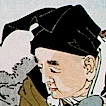
Matsuo Bashō 松尾 芭蕉
1644 – 1694 CE
The most famous poet of the Edo period in Japan and still internationally renowned and recognized as the greatest master of haiku, Bashō left his samurai status, urban fame and fortune to wander throughout Japan writing poetry. During periods of history in Japan, criticizing his poetry was considered blasphemous and many of his poems are reproduced on monuments. Some scholars believe he invented haiku and his verse greatly influenced Ezra Pound, the Imagists, and Beat Generation poets.
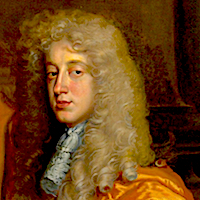
John Wilmot, Earl of Rochester
1647 – 1680 CE
A poetic shock to the Puritanical world-view
“Notorious libertine,” poet, friend to a king, "the best English satirist;” Wilmot spear-headed the swing away from the Puritan era. His “rakish” poetry shocked the status quo, was censored in the Victorian era, and regained popularity in the 1920’s influencing writers like Graham Greene and Ezra Pound. Famous and influential in his own time, he expanded the crumbling cracks in the Puritanical world view; but, died for his efforts from alcoholism and venereal diseases at only 33.
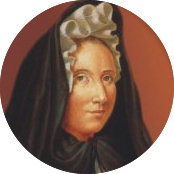
Madame Guyon Jeanne-Marie Bouvier de la Motte-Guyon
1648 – 1717 CE
Madame Guyon, Jeanne-Marie Bouvier de la Motte-Guyon (1648 - 1717)
French mystic, key advocate of Quietism, strong influence on the Quakers and other anti-materialistic Christian traditions; Madame Guyon was widowed at 28 having already borne 5 children. Advocating the ‘prayer of quiet’ and interior realization - teachings of Teresa of Avila and John of the Cross - she ran afoul of the Roman Catholic Church’s emphasis on believing in only external authority, was branded a heretic, and imprisoned in the Bastille for 7 years. Praying all the time and finding her God in every detail of life, she exemplified belief in basic goodness, the sacredness of all experience, and a genuine, European, Wu Wei tradition.
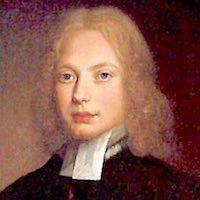
Jonathan Swift
1667 – 1745 CE
"Foremost prose satirist in the English language"
Poet, cleric, satirist, and political essayist; Swift became the most popular Irish author. His book, Gulliver’s Travels became the most popular work of Irish literature in international libraries. Although George Orwell said he disagreed with him on almost every issue, he listed him as one of his most-admired writers. Deeply involved in politics, he published many powerfully influential political pamphlets—all so provacative he had to publish anonymously or use a pseudonym.
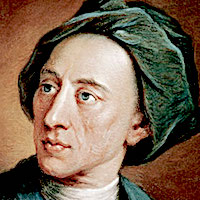
Alexander Pope
1688 – 1744 CE
Second most quoted English writer
Second most quoted English writer after Shakespeare, anonymous and profound influence on culture, compassionate commentator on humankind’s foolishness; Pope foresaw and criticized the growing materialism and consumerism of his era. His critiques were so pointed and insightful, they aroused such hatred that he was viciously slandered with lies and was forced to carry a pistol when he went for walks. From a Catholic family in England when Catholics were banned from teaching or going to a university; Pope’s aunt had to teach him to read and he was largely self-taught with help of sages like Homer, Horace, Virgil, Shakespeare, and Chaucer. Suffering ill health from an early age, he had a kind of tuberculosis from age 12 that turned him into a severe hunchback and limited his height unto only 4 feet, 6 inches. Transmuting his difficulties into art, he completed impressive translations, critical essays, and poems that created new forms as well as inspiring both people of his times and ours.

William Blake
1757 – 1827 CE
A poet, painter, and songwriter mainly unrecognized during his life and at the time considered mad, Blake is now called “far and away the greatest artist Britain has ever produced” and “a seminal figure in the history of poetry.” Not fully appreciated until more than 200 years after he died, he’s now considered one of the most powerful impacts on twentieth century culture with an enormous influence on Carl Jung, Aldous Huxley, poets like William Butler Yeats and Allen Ginsberg, songwriters like Bob Dylan and Van Morrison. The origin of graphic novels and fantasy art trace back to Blake.
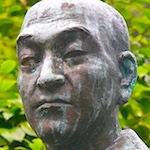
Ryokan 良寛大愚 (Ryōkan Taigu,“The Great Fool”)
1758 – 1758 CE
One of the most popular personalities in all of Japanese history, neither priest or lay person, “unthinkably kind” but strict practitioner, saturated with enlightenment yet calling himself “The Great Fool;” Ryōkan was a scholar, calligrapher, and poet yet spent his time with ordinary people. He took no disciples, gave no sermons, took no positions, and spent his time begging, playing with village children, writing and speaking some of the East’s best poems that bridge the gap between understanding the words and understanding the sense. Non-sectarian, a critic of institutional power and professionalism, and startlingly honest, today Ryōkan is a true Japanese national hero familiar to almost every child and respected by young and old, rich and poor, powerful and humble.
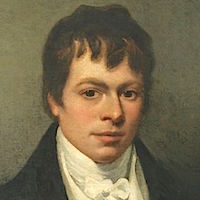
Robert Burns
1759 – 1796 CE
Tenant farmer, tax collector, "The Greatest Scot of all time,” people's poet of Russia, political radical, and writer of one of the wold’s most popular songs (Auld Lang Syne); Burns celebrated everyday life, farming, culture, religious practices, and love. Father of at least 13 children (most born out of wedlock) with at least 5 different women, his affairs were unencumbered even by loves who inspired some of the best love songs ever written. Far beyond it’s place as favorite US New Year’s Eve song, Auld Lang Syne is sung all over the world, was the Korean and Maldive national anthem, popular graduation song in Japan, and sung by troops in the American Civil War and during World War I.

William Wordsworth
1770 – 1850 CE
Orphaned at an early age, connected with the common man while wandering through Europe on foot, caught up in both the ups and downs of the French Revolution, and Britain's only Poet Laureate who wrote no official verse; Wordsworth defined poetry as "the spontaneous overflow of powerful feelings” and along with Samuel Coleridge, used poems based in common language to help launch the Romantic Age of literature. A student of John "Walking" Stewart who blended yoga and Eastern wisdom from India with western pantheism, he published some of the most influential poetry in Western literature.
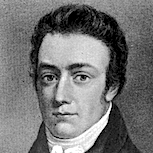
Samuel Taylor Coleridge
1772 – 1834 CE
One of the most influential English poets, co-founder of the Romantic Movement, prominent philosopher, gothic pioneer and leviathan impact on Mary Shelley, William Wordsworth, Thomas Carlyle, Emerson and American transcendentalism; Coleridge paid for his renown with poor health, depression, bipolar disorder, and a lifetime of opium addiction. Rescuing Shakespeare’s play Hamlet from denigration by critics, he established his reputation as aliterary critic. The instigator of "Conversational Poetry,” using common, everyday language to convey deep images and wisdom, he coined many still-used words like soulmate, selfless, pessimism, relativity, narcissism, actualize, and intensify

Novalis
1772 – 1831 CE
Poet, philosopher, mystic and civil engineer, Novalis (Georg Philipp Friedrich Freiherr von Hardenberg) only lived 28 years but in that short time still managed to condense his insight and poetic wisdom influencing Emerson, Hermann Hesse, Rilke, C.S. Lewis, Borges, and through George MacDonald, Tolkien, Mark Twain, GK Chesterton, Madeleine L'Engle. the Inklings, and the entire fantasy genre in literature.
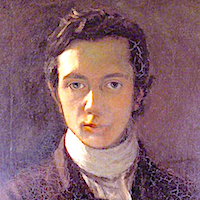
William Hazlitt
1778 – 1830 CE
One of the English languages best art and literature critics of all time
The most influential art critic of his age, considered the best essayist in the English language, and one of the English language’s greatest critics; Hazlitt befriended and helped Coleridge, Wordsworth, Keats, Jeremy Bentham, Stendhal and many of the 19th century’s most important writers. The keen psychological insight that makes him still relevant today however, didn’t go over very well in his own time. Both Wordsworth and Coleridge retaliated to his criticism by spreading negative rumors. Also a poet, journalist, and philosopher; he was devoted to his work but seldom popular enough to earn sufficient income, he had to depend on his wife’s independent wealth. When she left him, he continued his writing but sunk into poverty, illness, depression, and was “excommunicated from all decent society.”
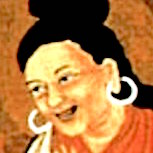
Shabkar Tsokdruk Rangdrol ཞབས་དཀར་ཚོགས་དྲུག་རང་གྲོལ།
1781 – 1851 CE
Prolific writer said to have written over 300 pages per day, famous lama, and student of the Mongolian king Chögyal Ngakgi Wangpo; Shabkar literally means “white feet,” a name given to him because his presence was so inspiration that it wherever he placed his feet became full of virtue and realization. Considered a reincarnation of Milarepa, he spent most of his life in retreats and composed “an ocean of songs.”
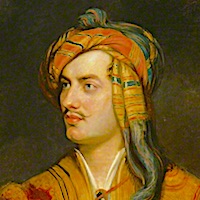
Lord Byron (George Gordon Byron)
1788 – 1824 CE
The first rock-star style celebrity
One of the best English poets, Greek national hero, first modern "rock-star" celebrity, revolutionary, politician, and major Romanticism influence; Lord Byron became renowned for a flamboyant bisexuality during a time when this was highly illegal. A major influence in the Romantic movement and close confidant of Percy Bysshe Shelley, he was known as "mad, bad, and dangerous to know." During his lifetime considered the greatest poet in the world; his fame continues throughout the world in 36 different Byron Societies, in over 40 operas, in his poetry set to music by Beethoven, Schubert, Schumann, Berlioz; and through the legacy of his daughter, a founding force in the first computer programming efforts.
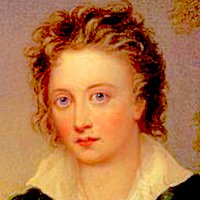
Percy Bysshe Shelley
1792 – 1822 CE
Another culture-transforming sage not recognized or appreciated during his lifetime, Shelley became regarded as one of the English language’s premier poets and transformers of political and social culture. A major influence on Thoreau's views on non-violent protest, political action, and his book, Civil Disobedience; he also inspired Karl Marx’s economic theories, Leo Tolstoy’s approach to non-violent resistance, Mahatma Gandhi, Martin Luther King Jr., and the world’s various Civil Rights Movements. During his 29-year life, most publishers became too afraid of being arrested to publish his work and his readership remained small and underground. From his tiny seed, however, our modern, humanistic culture sprouted.
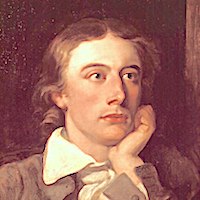
John Keats
1795 – 1821 CE
Writer of "poems as immortal as English"
One of the most popular poets of all time, Keats—in just 25 years of life—wrote what Will Durant called, “poems as immortal as English, and more perfect than Shakespeare.” Borges said that reading him was the most influential literary experience of his life, Tennyson called him the greatest poet of the 19th century, and Shelley wrote that his death was a national tragedy. He studied medicine and received a license to practice as a doctor and surgeon but chose the pure poverty of writing over financial security and social respect. During his lifetime, he published three volumes of poetry but during that time, sold only c. 200 copies. And far from foreseeing his future popularity, shortly before dying wrote, "I have left no immortal work behind me—nothing to make my friends proud of my memory.” His fame quickly grew however and his legend continues today in universities, movies, and books by authors including Dan Simmons, Tim Powers, and Julie Bozza.
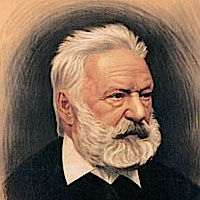
Victor Hugo
1802 – 1885 CE
Literary pioneer, poet, and social justice provocateur
Romantic literature pioneer, poet, artist, and one of the greatest French writers; Victor Hugo’s work influenced most of the social and political issues of his time. His literary success opened doors into the political world and he became more and more involved in politics. He campaigned against capital punishment and social injustice, for more freedom of the press, free education for children, universal voting rights, and a “United States of Europe.” While his books helped create important cultural and social shifts, his political efforts led to exile, a condemnation from Napoleon III, and death threats from mobs outside his house. His political work on ending the death penalty, however, did lead to its abolition in Geneva, Portugal, and Colombia. Two plus million people walked in his funeral procession and today almost all French cities have named streets after him.
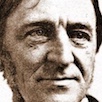
Ralph Waldo Emerson
1803 – 1882 CE
Champion of individualism
Friend and mentor to Henry David Thoreau and godfather to William James, Emerson championed individualism as a counterbalance to society’s conformist pressures. He wrote what Oliver Wendell Holmes considered America's “Intellectual Declaration of Independence” and he summarized his philosophy as “the infinitude of the private man.” The most influential writer of 19th-century America, he was called “the Concord Sage” and became the leading voice of intellectual culture in the United States influencing American religions to become more gnostic, less fundamentalist and conservative.

George Sand (Amantine Lucile Aurore Dupin)
1804 – 1876 CE
Intriguing, inspiring, and subversive; France's most famous 19th C. woman writer; friend to Franz Liszt, Balzac, Henry James, Browning, Dostoevsky, and Turgenev; famous lover of composer Chopin, and famous actress Marie Dorval, George Sand was a cross-dressing, cigar and hookah smoking, rebellious and scandalous dramatist and campaigner for important political reforms. Not the most likely person for this list, her creative courage and compassionate kindness make it an easy choice. As she wrote, “Know how to give without hesitation, how to lose without regret, how to acquire without meanness.”
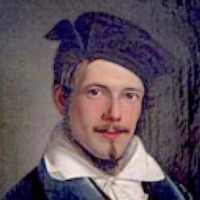
Friedrich Viktor Strauß
1809 – 1899 CE
First German Tao Te Ching translator
Theologian, poet, minister, translator, and scholar; Strauß published the first German Tao Te Ching translation in 1880. He also translated Chinese classic poetry, wrote novellas and gypsy romance. Sill popular today, his Tao Te Ching translation's 11th edition was published in 2004. His translation of the Shijing (Book of Songs) in 1880 became the first German translation. An ambassador and minister, he also translated his insight and understanding of Chinese wisdom into Western culture. Some of his hymns are still sung in churches and for weddings.
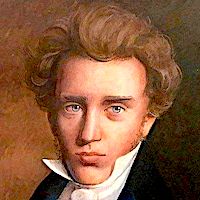
Søren Kierkegaard
1813 – 1855 CE
"The first existentialist philosopher"
Poet, theologian, social critic, philosopher and religious writer; Kierkegaard became a major influence on contemporary world culture. In the world of psychology, he founded Christian, humanistic, and existential schools inspiring therapists and theorists like Viktor Frankl, Carl Rogers, Erich Fromm, and Rollo May. In the field of literature, he influenced and inspired authors like Jorge Luis Borges, Hermann Hesse, W. H. Auden, Franz Kafka, Rainer Maria Rilke, J.D. Salinger and John Updike. His theological/philosophical influence extended to Martin Buber, Karl Jaspers, and Martin Heidegger. Kierkegaard emphasized experience over theory, personal life over "herd instinct," and Christianity as love rather than organization and dogma.
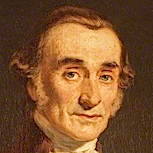
Charles Mackay
1814 – 1889 CE
English journalist in the US covering the civil war, Scottish poet, songwriter and novelist; Mackay used Gracian’s insight that “all fools are fully convinced” as a foundation for much of his writings. He described the Middle Ages mania called the Crusades, the 17th century Dutch tulip phenomenon as one of many economic/financial bubble manias, 16th- and 17th-century witch trials when thousands of people were executed as witches, and other national and philosophical delusions. A strong proponent and eloquent “apostle of doubt,” he wasn’t taken seriously during his lifetime but is still a big influence today referenced by stock traders, Forbes magazine, BusinessWeek, Neil Gaiman, Financial writer Michael Lewis, and many others.
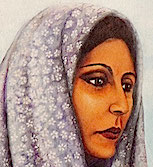
Táhirih طاهره (Fatimah Baraghani, "The Pure One")
1814 – 1852 CE
A genius-deep and curious mind living in a culture and with a husband who didn’t think women should read, be seen, or think for themselves; beautiful, educated, and from one of the most prominent families of her time, Tahirih is said to be the first woman to unveil and question Islamic political and religious orthodoxy which led to her imprisonment and execution. She rose above immense obstacles and became a famous poet, philosopher, and religious leader inspiring and organizing women to reject their oppression. “The first woman suffrage martyr,” her poems are still popular and her influence on Bábí, Bahá’í, and women’s rights are immense and continuing to this day.
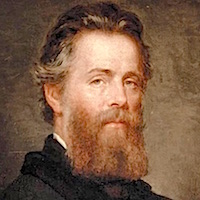
Herman Melville
1819 – 1891 CE
One of the best and most influential of all American writers but almost forgotten and unknown during the last 30 years of his life when he had to take a job as a Customs Inspector; Melville brought myth, scripture, philosophy, and mystical imagery to his haunting novels. Drawing on his adventurous ocean travels, he wrote Moby Dick which was a commercial failure and strongly criticized when first written but became a world classic described by D. H. Lawrence as "the greatest book of the sea ever written" and "one of the strangest and most wonderful books in the world.” Portraying the delicate dance between truth and illusion, the impossibility of deep and mutual communication, and the search for the absolute in the relative; his works gave a deep and powerful color to world literature.
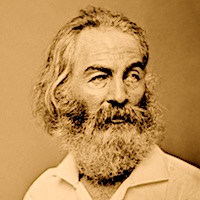
Walt Whitman
1819 – 1892 CE
Premier "poet of democracy" and model for Dracula
“Father of free verse,” one of the most influential American poets, humanist, journalist, Civil War volunteer nurse; Whitman blended realism and transcendentalism and became known as the first "poet of democracy.” His most famous work, Leaves of Grass, was called everything from "trashy, profane & obscene, the author a pretentious ass" to a work more central to American culture than Melville's Moby-Dick, Twain's Huckleberry Finn, and Emerson's The Conduct of Life. Vociferously criticized for being obscene with sexuality themes, it was admired by Thoreau, Ralph Waldo Emerson, Amos Bronson Alcott, and Oscar Wilde. Though biographers assert that Whitman was gay, he always denied it and claimed to have 6 illegitimate children. In a contrast between his poetry and personal views, he promoted equality and true democracy in the former, status quo views of nationalism and racism in the latter. His poetic and vagabond lifestyle inspired the Beat movement, Allen Ginsberg, Jack Kerouac, Gary Snyder, Lawrence Ferlinghetti, Bob Dylan, and Bram Stoker who used him as the model for his character, Dracula.
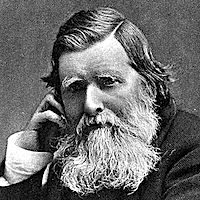
John Ruskin
1819 – 1900 CE
John Ruskin (1819 - 1900)
Strong and continuing international advocate for sustainability and protecting the environment, Christian socialist, leading Victorian era art critic, poet, philanthropist, and social thinker; Ruskin wrote over 250 manuscripts, influencing his contemporaries and many strands continuing today into modern culture. Admired by Proust, Gandhi, and Ryuzo Mikimoto in Japan; Leo Tolstoy called him, "one of the most remarkable men not only of England and of our generation, but of all countries and times.” Emphasizing the unity of nature, art, and culture; he developed principles for an ideal society which were used to set up many “Utopian Colonies.” His ideas helped found the modern Olympic Games, the British welfare state, many kind of social insurance programs, as well as the “garden city movement” that first included "greenbelts" in urban planning.
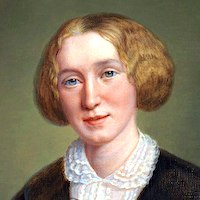
George Eliot (Mary Anne Evans)
1819 – 1880 CE
Pioneering literary outsider
Poet, journalist, translator, novelist, agnostic humanist, political agitator, and courageous follower of her own path; George Eliot wrote what some consider the best novel ever written in the English language (Middlemarch). Known for their psychological insight, her novels reflected her personal experience on the edges of the social, religious, and political fringe. Using a male pen name to escape the strong, feminine stereotypes of her era, this strategy also helped shield her from personal life scandals arising from norm-breaking situations like her adulterous relationship with philosopher George Henry Lewes and her marriage to John Cross who was 21 years younger. Her father didn't consider her beautiful enough to ever find a husband but clearly saw her high intelligence and financed a classical education for her far beyond what was normally available for women. Her father's wealth and high social status also gave her a clear perception of the extreme contrasts between the rich landowners and impoverished people living on those estates. This became a frequent theme in her books.
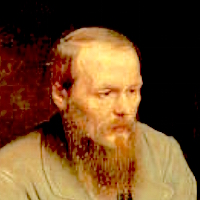
Fyodor Mikhailovich Dostoyevsky Фёдор Миха́йлович Достое́вский
1821 – 1881 CE
One of history’s most influential novelists and one of the greatest psychologists in world literature; Dostoyevsky led a tortured life that included being arrested for discussing banned books, being sentenced to death, spending 4 years in a Siberian prison camp, 6 years of forced/exiled military service, and struggling with a gambling addiction that made him have to beg for money. His second wife who he met when she was 19 and he 25 years older, helped turn his life around and produce some of the world’s best literature. His books have been translated into more than 170 languages and he was admired by Hermann Hesse, Ernest Hemingway, James Joyce, Kafka and Sartre. Albert Einstein called him a "great religious writer,” Nietzsche “among the most beautiful strokes of fortune in my life", Sigmund Freud called The Brothers Karamazov "the most magnificent novel ever written,“ and Virginia Woolf said, "Out of Shakespeare there is no more exciting reading.” His influence in modern time extends to the existentialists, surrealists, and the Beat generation.
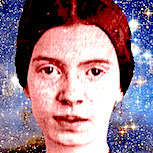
Emily Dickinson
1830 – 1886 CE
Though now considered one of the greatest figures in American literature and one of the most important poets, only a few of Dickson’s poems were published during her lifetime and those were significantly edited and changed by publishers. Her first collection wasn’t printed until years after her death and a complete collection wasn’t published until 1955. A serious student of botany, she made and maintained a vast collection of plants; highly introverted, creative, unique, and challenging the assumptions of her time; she seldom left her house but wrote 40 volumes of almost 1800 poems.
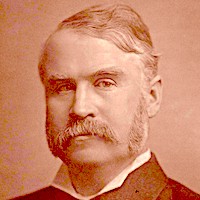
W. S. Gilbert
1836 – 1911 CE
Innovative, influential, inspiring dramatist
Poet, illustrator, and dramatist; Gilbert wrote 14 comic operas with music written by Sir Arthur Sullivan and over 75 plays—many still being performed c. 150 years after they were written. Ridiculing party politics, nepotism, patriotism, and the British class system; they may have not gone out of style because they were never in any kind of conventional style to start. The innovative creativity in their performances came in part from their ability to finance the productions themselves rather than having to rely on conventional funding that required artistic restraints and conformance to traditional methods. Gruff and quick-tempered on the outside, warm and a loyal friend when close, Gilbert set new styles and became an important influence on most playwrights that came after him especially in the line of Oscar Wilde and George Bernard Shaw.
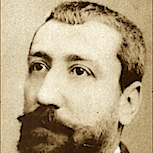
Anatole France (Jacques Anatole Thibault)
1844 – 1924 CE
Son of a bookseller and true bibliophile, librarian for the French Senate, and modern lineage holder of Epicurean thought; Anatole France was venomously attacked by Nazi collaborators but defended and admired by George Orwell. His entire set of writings were banned and prohibited by the Roman Catholic Church but in 1921 awarded the Nobel Prize in Literature "in recognition of his brilliant literary achievements, characterized as they are by a nobility of style, a profound human sympathy, and grace.” Journalist, poet, social commentator, historian, playwright, and famous novelist; he became the model for a narrator in Proust's In Search of Lost Time.
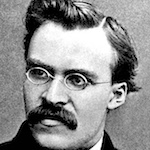
Friedrich Nietzsche
1844 – 1900 CE
Philosopher, scholar, poet, unifier of opposites and courageous critic of Western Civilization, Nietzsche proclaimed that “God is Dead,” that Christianity is “one great curse, one great intrinsic depravity,” and then started a “campaign against morality.” With a deep appreciation for Buddhism and rejecting external authorities like a “God” or a Church, he extolled the ability for people to discover their own morality grounded in reality rather than following herd-based ethics and beliefs. With a dedication to the sense over the words, people as diverse as D. H. Lawrence, Mishima, Rilke, Jack London, Hermann Hesse, Martin Heidegger, Carl Jung and many others described him as a most important influence on themselves personally as well on as society and the evolution of consciousness.

Robert Louis Stevenson
1850 – 1894 CE
Humanist, social and political critic, poet, composer of over 120 complex musical works, 26th most translated author in the world; Stevenson grew up in a religious family of engineers frail, sickly, and alienated. His father once said, "You have rendered my whole life a failure.” Fiercely criticized by Virginia Woolf and early literary critics but praised by Borges, Proust, Arthur Conan Doyle, Hemingway, Kipling, Jack London, and Chesterton; he now ranks alongside Henry James and Joseph Conrad. In spite of physical frailty, he traveled widely and supported his writing with hard labor and a frugal lifestyle often surviving long periods living on less than 40¢/day. He saw himself, his time, and culture with a rare self-clarity that cut to the deep basic goodness manifesting in his unforgettable characters.
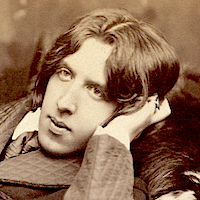
Oscar Wilde
1854 – 1900 CE
Oscar Wilde (1854 - 1900)
Prolific Irish poet, writer, journalist, and one of the most successful playwrights of his time; Wilde rebelled against his moralistic, Victorian environment with an “unequivocal inclination toward the unconventional” favoring passion and sensual pleasure. Strongly influenced by his teacher, John Ruskin, he transformed his more hedonistic tendencies into deep social concerns and wrote against decadence, duplicity, and libel. Married and with two sons, his writings went against popular opinion by describing women as creative and intelligent. His liaisons with men however led to a trial for homosexuality, incarceration, a severe injury in prison after collapsing from illness and hunger, and later death in extreme poverty. In many ways, his life seems to have exemplified his famous aphorism, “No good deed goes unpunished.”
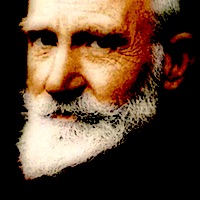
George Bernard Shaw
1856 – 1950 CE
UK playwright second only to Shakespeare
Playwright second only to Shakespeare, political activist, provocative idea generator, theatre and music critic; Shaw wrote over 60 plays, won a Nobel Prize in Literature, and an Academy Award. He promoted, popularized, and evolved the ideas of luminaries like Nietzsche, Samuel Butler, Marx, Shelley, Blake, and Dickens while using his plays to advocate for political and religious ideals as well as many controversial topics like promoting eugenics, opposing organized religion and vaccinations, criticizing both sides during World War I, and expressing esteem for dictators like Mussolini and Stalin. An insatiable originator, he frequently and intentionally proposed contradictory views, controversial political stands, and declined all public honors. He worked hard encouraging people to think for themselves
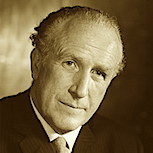
Arthur Desmond
1859 – 1929 CE
Arthur Desmond (c. 1859 – 1929), aka Arthur Uing, Ragnar Redbeard, Richard Thurland, Desmond Dilg, Gavin Gowrie
Bank-bashing heroic reformer, “The Poet of Revolution,” author, and politician; Desmond started a political organization dedicated to “emancipation from poverty, competitive commercialism, industrial wage slavery, tyrannical authority, and mental bondage." Like Machiavelli and his satirical book The Prince, Desmond was slandered by the rich and powerful plutocrats of his time as an immoral, satanic figure, advocating Social Darwinism, racism, and fascism. His book, Might Is Right, however, was called by fellow labor movement collaborators, “one of the greatest books ever written." He promoted land reform, the nationalization of large estates and banks, single taxation and called bank directors "scoundrels", large estate owners "blood-sucking leeches" and the local press as "hirelings of monopoly.”
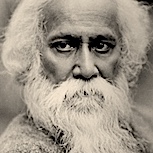
Rabindranath Tagore
1861 – 1941 CE
Author, painter, “the greatest poet India has produced,” and song writer of over 2000 songs including the national anthems for India, Bangladesh, and Sri Lanka; Tagore was the first non-European to win the Nobel Prize in Literature. A universal internationalist, he was strongly against nationalism and introduced Indian culture to the West as well as Western culture to India. A close friend of Gandhi, he renounced his British knighthood and gave voice to the deeper wisdom within all strata of society: rich and poor, powerful and humble.
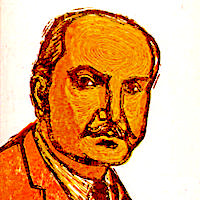
Santayana, George (Jorge Agustín Nicolás Ruiz de Santayana y Borrás)
1863 – 1952 CE
Powerfully influential, true-to-himself philosopher/poet
Poet first, philosopher second, novelist, Harvard dropped-out professor, Christian-atheist, free-thinking cultural critic; Santayana mixed his poetic genius with deep, philosophic insights; beauty with truth. Born in Spain, he brought an old European flavor and aristocratic appreciation to his new but temporary American homeland saturated with the idealism and individualism of Emerson and Thoreau. Many of his aphorisms have progressed from words of wisdom to cliché to truism. ("Those who cannot remember the past are condemned to repeat it") Professor to students like T. S. Eliot, Robert Frost, Gertrude Stein, Walter Lippmann, W. E. B. Du Bois, Conrad Aiken, and Supreme Court Justice Felix Frankfurter; major influence on thought-leaders like Bertrand Russell and Alfred North Whitehead; Santayana’s influence on awakened evolution continues
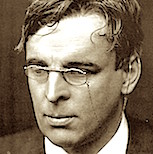
W.B. (William Butler) Yeats
1865 – 1939 CE
Symbolist poet, Irish Senator, and icon of 20th-century literature; Yeats won the Nobel Prize for literature in 1923 which enabled him for the first time to pay off his and his father’s debts. Though dabbling in the occult and automatic writing in his youth, he became a standard-bearer for Irish cultural independence and nationalism. Challenging the Irish Catholic political dominance, he championed divorce rights and confronted religious leaders but later supported aristocratic over democratic rule. Called by Ezra Pound "the only poet worthy of serious study,” his personal evolution of Hindu-based spiritualism helped inspire some of the "most potent images in twentieth-century poetry.”
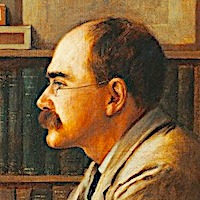
Rudyard Kipling
1865 – 1936 CE
Greatest—in-English—short-story writer
Journalist, poet, novelist, major short story writing innovator, youngest and first Englishman to receive the Nobel Prize in Literature; Kipling was born in India and quickly became one of the most popular prose and verse writers of his era. Accused by critics of racism, misogyny, and imperialism; George Orwell believed that Kipling sold his soul to the British, colonial establishment and he did support a military figure responsible for a massacre. A contemporary Indian writer said he had a much better understanding of animals than of the Indian people he wrote about. However, his fame endures, his children’s books remain popular classics, his poetry is still being recorded, his adult fiction is still in print, and his deep influence on Scouting movements continues.
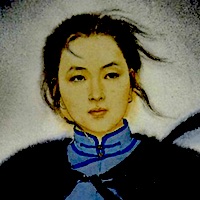
Qiu Jin 秋瑾
1875
"China’s Joan of Arc"
Feminist revolutionary, poet, Chinese national heroine, "Woman Knight of Mirror Lake"; Qiu Jin became a famous and inspiring historical martyr. Involved in a secret society working to overthrow the corrupt Qing Dynasty, she studied martial arts, wore Western male clothes, joined Sun Yat-sen's revolutionary group, and while in Japan edited a popular journal. She wrote and eloquently advocating women's right to education, to choose their own husbands, and the abolishment of foot binding. Her challenge to China’s entrenched patriarchy led to her—when only 31 years old—arrest, torture, and beheading.

Rainer Maria Rilke
1875 – 1926 CE
Profound singer of universal music
One of the most popular and best-selling poets of all time, a Catholic who believed that Jesus had a baby with Mary Magdalene, secretary to famous sculptor Rodin, lover and confidant of married Sigmund Freud student, psychoanalyst, and Nietzsche’s love focus, Lou Andreas-Salomé; Rilke’s mystical writings are still frequently quoted on TV, in movies, music, and self-help books. Taking art as religion and the only source of human redemption, he reconciled dichotomies like life and death, suffering and joy, beauty and destruction unifying opposites and finding deep meaning is all experience. He described god as nature, life force, and an evolving consciousness only slowly coming into existence. Hermann Hesse wrote that “through him resounds the music of the universe.”
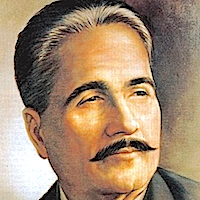
Muhammad Iqbal محمد اقبال
1877 – 1938 CE
Muhammad Iqbal محمد اقبال (1877 – 1938)
"Spiritual father of Pakistan,” politician, "Poet of the East,” scholar, ‘Sage of the Ummah,”and one of the most important figures in all of Urdu literature; Muhammad Iqbal was knighted by King George and praised by US Supreme Court Associate Justice William O. Douglas though also condemned by Western leaders because of his anti-capitalist views. In 1930 he proposed the creation of a Muslim state in Northwest India, and is now considered the ideological founder of Pakistan as well as a main inspiration for the Iranian Revolution. Fighting hard against racial, religious, national social and all forms of oppression, inequality, and discrimination; he promoted democracy, humanism, peace and friendship.
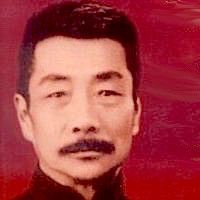
Lǔ Xùn 鲁迅 (Zhou Shuren; Lusin)
1881 – 1936 CE
Insightful satirist representing the "Literature of Revolt"
From an impoverished background, Lu Xun rose to become one of modern China’s most popular and influential writers. He was highly admired by Mao Zedong who called him "the saint of modern China" and the "chief commander of China's Cultural Revolution” but who also misquoted his words, purged his followers, suppressed the intellectual openness and penetrating political insight that Lu Xun represented, and said that if he was still alive, he would have stopped writing or gone to jail. A prolific translator and biting satirist, his works are established classics still popular today, required reading in both Chinese and Japanese schools but were banned in Taiwan for almost 50 years. A penetrating social critic often compared to Nietzsche, he was a "champion of common humanity,” an amplifier and translator of ancient wisdom into modern idiom.
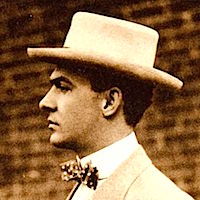
Witter Bynner (Emanuel Morgan)
1881 – 1968 CE
Translator, poet, and scholar; Bynner traveled and lived in China, intensely studied Chinese culture, and worked for 11 years translating T'ang Dynasty poems. A student of George Santayana at Harvard, he was a conscientious objector during World War I, and championed the women’s suffrage movement. Writing more than 39 books himself, he also actively supported poets and artists becoming friends with D.H. Lawrence, Georgia O'Keeffe, Carl Sandburg, Ansel Adams, Willa Cather, Igor Stravinsky, Robert Frost, W. H. Auden, and Aldous Huxley. Sponsoring Kahlil Gibran, he helped him publish The Prophet.
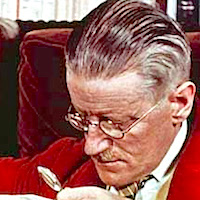
James Joyce
1882 – 1941 CE
James Joyce (1882 – 1941)
Polyphonic novelist, poet, one of the most influential 20th century writers, stream of consciousness avant-garde modernist; Joyce revolutionized modern fiction while - according to a psychoanalyst - using his writing to avoid a complete psychotic break. A huge influence on philosophers and writers as varied as Borges, Rushdie, Beckett, Robert Anton Wilson, Joseph Campbell, and John Updike; his influenced crossed over into the world of science as he became the source of the now popular scientific term, “quark..” Finnegans Wake - considered the most challenging work ever written in the English language - shines as a monument to the possibilities of creative spirit unshackled by regard for public opinion. Although considered one of the greatest novels ever written., controversy and resistance kept his novel Ulysses from being published in the USA until 12 years after it was written. His writing style and content brings out the deeper reality of situations and experiences pointing toward the sense rather than the words.
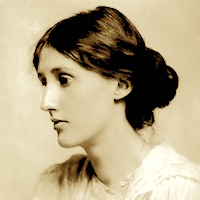
Virginia Woolf
1882 – 1941 CE
Stream of consciousness writing pioneer, one of the most influential 20th century writers, “the major lyrical novelist in the English language,” and “feminist inspiration;” Woolf struggled with mental illness all her life and yet wrote some of the era’s best short stories and novels, some translated into 50 languages. A deep influence on world culture, she promoted universal education, intellectual freedom, class equality, and feminism. Still popular today, the National Portrait Gallery in London sells more of her postcards than of any other. With a deep understanding of inner, psychological struggle, her characters expose the sacred within the ordinary, the profound in the midst of the commonplace.
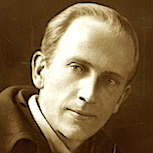
A.A. Milne (Alan Alexander Milne)
1882 – 1956 CE
Student of H. G. Wells, friend of authors J. M. Barrie and Arthur Conan Doyle, military propaganda writer during World War I and peace advocate afterwards; Milne resisted the selling out of authors for monetary gains saying he would rather write a telephone directory at his own inspiration than a Blank Verse Tragedy at others’ direction. Made famous after his death by Walt Disney productions, his Winnie the Pooh imagery - second only to Mickey Mouse - inspired $6 billion worth of products. His “children’s” books (especially Now We Are Six) open psychological doors into direct experience of nowness and appreciation of the sacred quality of simple, everyday perception.

William Carlos Williams
1883 – 1963 CE
Life-long physician, pediatrician, friend to Ezra Pound; Williams worked as a doctor by day, as a writer by night, merged poetry with painting, imagery with modernism. His literary experimentalism working to create a new art form was so radical it was even criticized by radical experimentalists. Overshadowed by the timing and work of T.S. Eliot, Williams abandoned and criticized this intellectual style favoring instead American colloquial English writing an epic poem of place about Paterson, NJ. Mentor to the Beat Poets and in particular Allen Ginsberg, he won the first National Book Award for Poetry, the Gold Medal for Poetry, and posthumously the Pulitzer Prize.
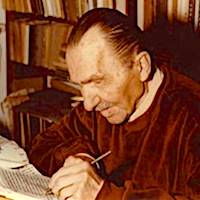
Nikos Kazantzakis
1883 – 1957 CE
Fearless philosopher, poet, translator, prolific writer, and spiritual alchemist; Kazantzakis was condemned by the Catholic Church and the Orthodox Church wouldn’t even let him be buried in a cemetery. He followed in the Zen/Taoist tradition of synthesizing opposites and reconciled Buddhism and Christianity, philosophy and politics, sensuality and a spiritual path. An extensive traveler in both the east and west, he was given the International Peace Award and made great contributions to culture beyond nationalism, religion, and sectarian view.

Kahlil Gibran
1883 – 1931 CE
After Shakespeare and Laozi, Gibran is the third best-selling poet of all time. His friends included WB Yeats, Carl Jung and Auguste Rodin. Elvis Presley was deeply influenced by Gibran, read passages to his mother, made notes in the margins, and gave away copies of The Prophet to his friends. Johnny Cash was also a big fan and John Lennon adapted lines from his poetry into his songs.
{Maronite Christian, Bahá’í, Sufi}
The Prophet, Sand and Foam, The Earth Gods, The Broken Wings, Love Letters in the Sand.
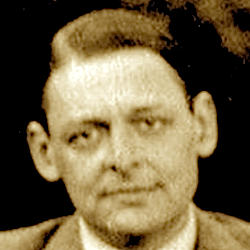
T. S. Eliot
1888 – 1965 CE
T.S. Eliot, Thomas Stearns Eliot (1888-1965)
Literary and social critic, "one of the twentieth century's major poets,” publisher and playwright, Nobel Prize winner and “the poet of the modern symbolist-Metaphysical tradition;” T.S. Eliot wrote some of the best known English poems. Reversing the more common trend, he was more respected during his lifetime, less so after but still almost universally acknowledged as a pioneering and major influence on modern poetry. He emphasized insight and poetry arising from the unconscious mind. Often accused of anti-Semitism, he described himself as a "classicist in literature, royalist in politics, and anglo-catholic in religion".
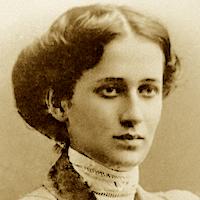
Anna Akhmatova Анна Ахматова (Andreyevna Gorenko)
1889 – 1966 CE
Russia's most loved female poet
One of the most famous Russian poets, strikingly original and courageous critic, powerful and legendary Russian heroine; Anna Akhmatova's chose to remain in her country rather emigrate when her work was condemned by Stalinist censors, her first husband was killed by Soviet secret police, and her son and common-law husband were thrown into the Gulag. During this time her poetry was circulated on scraps of paper that were read once and then immediately burned.
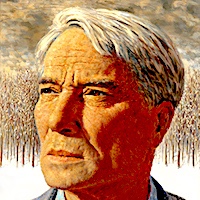
Boris Pasternak Бори́с Леони́дович Пастерна́к
1890 – 1960 CE
Russia's greatest poet
Poet, translator, composer, and novelist; Pasternak wrote some of the most popular poems ever written in the Russian language. Leo Tolstoy was a close family friend and Pasternak's father illustrated his books. Other family friends included Rachmaninoff and Rainer Maria Rilke. Family connections and literary status kept him alive during the Stalin years but even during the Khrushchev era his books were censored. At great personal risk and fearing a firing squad he published Doctor Zhivago in Italy. With the support of the the British MI6 and the American CIA, the book found a wide audience, won a Nobel Prize that Pasternak was forced to reject, and initiated family persecutions that continued until Gorbachev in the 1980s. Since 2003 however, it is read by all 11th grade Russian high school students.
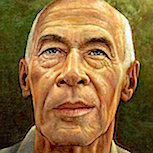
Henry Miller
1891 – 1980 CE
Banished from the UK, literary bohemian in 1930’s Paris, painter of over 2,000 watercolors, author of over 50 books (many banned for a generation), anti-Vietnam War voice, “one of the most iconoclastic literary spirits of our time,” legendary lover from Anaïs Nin to Playboy magazine star Brenda Venus when he was 84 years old; he pioneered new literary forms, attacked respectability, broke cultural taboos, and in one of the main events in 1960’s sexual revolution, won a Supreme Court decision on obscenity. Continuing a tradition from Dostoyevsky, Balzac and Nietzsche; he was an important influence on Jack Kerouac, Philip Roth, Alan Ginsberg and Norman Mailer who called him “the writer’s writer.”

Pearl Buck
1892 – 1973 CE
Growing up and living in China as the daughter and wife of Christian missionaries, Pearl Buck described their arrogance and manipulation arguing against the benefit of missionaries and an institutional church. Denounced in China during the cultural revolution and prevented from visiting with Richard Nixon, she wrote 60+ books, won a Pulitzer, and became the first American woman to win the Nobel Prize for Literature. Long before they became popular or safe positions, she publicly challenged gender and racial discrimination while founding the first interracial and international adoption agency that placed over 5000 “unadoptable” children.
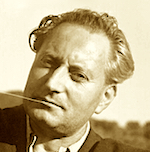
Jean Giono
1895 – 1970 CE
Jean Giono (1895 – 1970)
Son of a cobbler, one of France’s greatest writers, twice imprisoned pacifist, follower of Walt Whitman’s egalitarian pantheism, and grandfather to the modern ecological movement; Giono wrote numerous novels, short stories, articles, and poems. A master of metaphor, his masterpiece work The Man Who Planted Trees was rejected by Reader’s Digest for being too metaphoric. In response, Giorno refused any royalties, surrendered all his rights releasing it into the public domain, and gave free use to anyone who wanted to use it. Within 4 years it was translated into 12 languages and soon became a classic inspiration for everyone concerned with the environment and sustainability. An animated version won an Academy Award in 1988 and it’s considered one of the best animated films of all time.
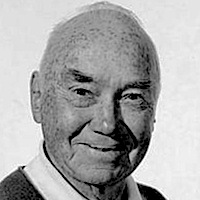
Paul Reps
1895 – 1990 CE
Author, artist, and early Western haiku poet; Paul Reps became a major welcoming influence for Zen coming to America
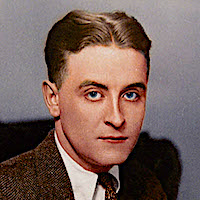
F. Scott Fitzgerald
1896 – 1940 CE
Prototype of "Jazz Age" exuberance
One of the greatest American writers, prototype of "Jazz Age" exuberance, and symbol of the "Lost Generation"; Fitzgerald became popular and successful during his lifetime but not respected in the literary world until after his death. His passion for writing interfered with his college pursuits and he had to drop out of Princeton and join the army where he became a student of Dwight Eisenhower whom he passionately disliked. During this time he met his future wife, Zelda Sayre who was the daughter of a state Supreme Court justice but she wouldn't marry him until his first novel became famous and he finally had an income steady enough to support her opulent lifestyle. Her later mental illness, his alcoholism, health and financial problems plagued his later years and he died from a heat attack when only 44.
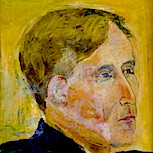
Arthur Waley
1899 – 1969 CE
East to West ambassador, remarkable Chinese and Japanese translator called a "great transmitter of the high literary cultures of China and Japan,” sinologist, and poet in his own right; Waley’s poetic translations based on understanding not just the words but the sense as well, pioneered a new understanding and appreciation of oriental philosophy in the west. His Tao Te Ching translation, The Way and Its Power is one of the best older version translations with clear and insightful commentaries.
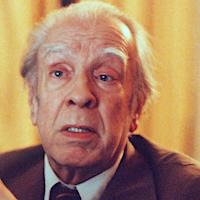
Jorge Luis Borges
1899 – 1986 CE
Literary Explorer of Labyrinthian Dreams, Mirrors, and Mythologies
Argentinian, pioneering poet, translator, librarian, lecturer, and short-story writer; Borges helped begin the magical realism style of literature. A world traveler and completely blind by the time he was 55 years old, his lack of external sight contributed to his vast and colorful worlds of imagination. He wrote many and popularized the style of writing commentaries on imaginary books and biographies of imaginary authors. A harsh critic of Juan Perón and his wife, Evita, he described in detail their private lives of corruption as well as their effective propaganda, "tales and fables made for consumption by dolts." After he died, Peronist leaders wouldn't even accept him as an Argentine.

Antoine de Saint-Exupéry
1900 – 1944 CE
French war hero, famous writer, poet, journalist, pioneering aviator, and an international inspiration for social aid and humanitarian projects; Antoine has the unique distinction of having his books banned by both Nazi occupied France as well as de Gaulle’s “Free” France. Modern France though voted The Little Prince the best book of the 20th century and holds him in such high esteem that his image and several of his drawings were printed on paper money, coins, and the stamps of more than 25 countries. Translated into more than 250 languages and full of deep but simple wisdom, The Little Prince is the 4th most-translated and one of the best selling books of all time.
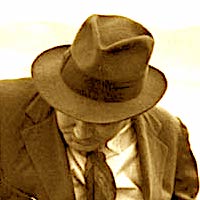
Thomas Wolfe (Thomas Clayton Wolfe)
1900 – 1938 CE
Father of autobiographical fiction
North Carolina's most famous writer, father of innovative autobiographical fiction, novelist, playwright, and major influence on the Beat Generation writers; Wolfe lived a short but creatively influential life. His famous novel, Look Homeward, Angel included more than 200 thinly disguised references to family and friends in his hometown of Asheville, NC. Their outrage to this book basically exiled him for 8+ years but their equally negative response to his next book was caused by them not being included. William Faulkner called him the greatest talent of their generation, Jack Kerouac idolized him, Ray Bradbury was so impressed he included Wolfe as a character in one of his books, Prince of Tides author Pat Conroy credited him with sparking his writing career, and Hunter S. Thompson thanked him for his famous phrase "Fear and Loathing".
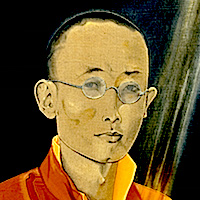
Gendün Chöphel དགེ་འདུན་ཆོས་འཕེལ།
1903 – 1951 CE
Child prodigy, iconoclast, artist, master debater, greatest Tibetan poet of the 20th century, Buddhist monk from an early age, modern Tibet’s first historian, and one of the most influential modern Tibetan intellectuals; Gendun Chopel kept a non-sectarian view throughout his life and challenged cultural, religious, and political dogmas. He lived with Nicholas and Helena Roerich for 2 years helping their son translate the Blue Annals which became a 1275 page book. He abandoned his monastic vows, drank alcohol, practiced and wrote the first Tibetan guide to love and sex. Having traveled and studied widely, he realized the importance of abandoning blind superstition and integrating Tibetan culture into the modern world. Instead of heading his warnings and developing Tibet in this way however, the conservative, status quo establishment had him whipped and imprisoned, ignored his message until the Chinese army arrived in Lhasa.
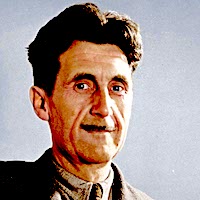
George Orwell
1903 – 1950 CE
English, poet, humanist, apostle of doubt, and powerful political influence
George Orwel, Eric Arthur Blair (1903–1950)
Novel-writing journalist, one of the best English essayists, ranked second on a list of "The 50 greatest British writers since 1945,” insightful literary critic, humanist, poet and powerful political influence; Orwell transformed a life filled with failure, poverty, and humiliation into literary genius and cultural influence. Originator of many words and phrases that have become part of popular culture—"Thought Police", "Big Brother", “Cold War,” "memory hole", "doublethink", “Orwellian,” and "thoughtcrime”—his writing exposed intellectual hypocrisy, social injustice, totalitarian and authoritarian influences, and turned his difficult experiences into great literature.
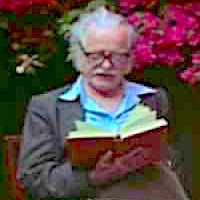
Kenneth Rexroth
1905 – 1982 CE
"Father of the Beats”
A philosophical anarchist, "Father of the Beats,” translator, Chinese scholar and translator; Rexroth introduced Allen Ginsberg to Gary Snyder, mentored Lawrence Ferlinghetti and testified on his behalf in his obscenity trial for publishing Ginsberg’s book, Howl. He appeared as a character in Kerouac’s book Dharma Bums and wrote the article on Literature for the Encyclopedia Britannica. A UC lecturer famously popular with students but cringingly infamous with administrators because of his inflammatory critiques of campus culture, he was a pacifist and conscientious objector during World War II while devotedly helping interred Japanese-Americans. His philosophy condensed into a view of society and culture as a “social lie” maintained to preserve the rich and powerful’s ability to exploit the majority

Lewis Thomas
1913 – 1993 CE
Gestaltist of science and art
Innovative blender of poetry with medicine and scientific thought, Thomas broke out of traditional thought patterns to advance more insightful and beneficial approaches to modern psychological, social, and political problems. An early advocate for an ecological approach, he used etymology as a way of creating a holistic understanding of the cultural challenges brought about by new discoveries. A poet himself as well as physician, educator, researcher, and policy advisor; his influence continues through the Lewis Thomas Prize given each year by The Rockefeller University as well as his frequently quoted insights
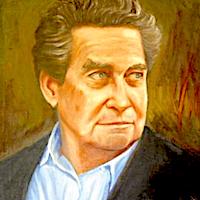
Octavio Paz
1914 – 1998 CE
Persuasive poet and convincing social commentator
Poet, diplomat, penetrating social commentator, one of the most important 20th century writers, and one of the greatest Hispanic poets; Octavio Paz dissolved his cultural prejudices and became a true world citizen. After traveling extensively in Asia, Europe, and the USA, he became Mexico’s ambassador to India. He criticized his countrymen as “instinctive nihilists who hide behind masks of solitude and ceremoniousness" and resigned from his Mexican diplomatic service when the government massacred students in 1968. Famous for his remarkable poetry that won a Nobel Prize for Literature, he balanced this kind of writing with influential political commentaries in popular magazines he founded.
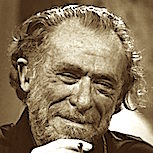
Charles Bukowski
1920 – 1994 CE
"Laureate of American lowlife”
Called "laureate of American lowlife,” “the original Big Lebowski,” “pulp-fiction hero,” and “king of the underground;” Bukowski wrote over 60 books, thousands of poems, hundreds of short stories, and was the writer behind Robert Crumb’s famous comics. Icon of the Los Angeles cultural life of his time, lover of alcohol, affairs, and outrageous creativity; he became the epitome and symbol of the anti-social, utterly free, and uninhibited bachelor. An intensely captivating and mesmerizing figure, his life and story show up in film personalities including Jean-Luc Godard, Ben Gazzara, Mickey Rourke, Faye Dunaway, Sean Penn, Dennis Hopper, Bono, Tom Waits, Julianne Moore, Jeff Bridges, Matt Dillon, and many more.
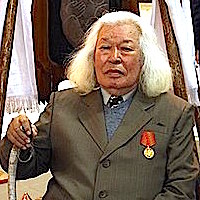
Mongush Kenin-Lopsan Монгуш Кенин-Лопсан
1925 CE –
Head shaman in the Russian Republic, respected historian, archaeologist, writer of more than 50 books, poet, and cultural healer; Kenin-Lopsan was born into a family of nomads and shamans but studied in universities and received Master's and doctoral degrees. He won many literary prizes but was persecuted and imprisoned during the Soviet Union era. When shamanism was recognized by the Russian government and their rituals no longer banned, he helped this tradition re-emerge and grow.

Allen Ginsberg
1926 – 1997 CE
Eloquent instigator, figurehead and voice for the Beat Generation of the ’50s, the counterculture of the 60’s and the flowering of Buddhism in America during the 70’s and 80’s; Ginsberg symbolized a powerful influence against materialism, the military-industrial complex, and conformity. His poem "Howl” written during a time when homosexuality was a crime in every U.S. state was confiscated by police, seized by US Customs, and started a famous obscenity trial that led to more legal and cultural acceptance for the LGBT community. For decades, a powerful advocate for free speech, gay rights, and non-conformity; a tireless opponent and protestor against the Viet Nam War, the War on Drugs, imperialism, the failure to protect refugees, and persecution of minorities; at the request of his Tibetan teacher Chögyam Trungpa and along with Anne Waldman started The Jack Kerouac School of Disembodied Poetics.
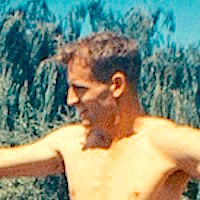
Neal Cassady
1926 – 1968 CE
Beat Generation generator, one of the most significant literary and pop-culture figures of the 20th century, the most famous Colorado native, pioneering stream-of-consciousness writer, reason for Kerouac and Ginsberg moving to Denver, (in)famous lover, inspiration for Bob Dylan and much of the 1960’s soundtrack; Neal Cassady is a little-known but deep influence on the best of today’s culture. Homeless son of an itinerant, alcoholic barber; stealer of more cars than any other person in Colorado’s history (500+ between ages 14 to 21); Cassady is immortalized in Grateful Dead songs, as Dean Moriarty in Kerouac’s On the Road, Cody Pomeray in Dharma Bums, the mad driver of Further in Wolfe’s Electric Kool-Aid Acid Test and most likely Randle McMurphy in Ken Kesey's novel, One Flew Over the Cuckoo's Nest.
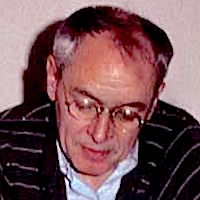
R. D. Laing
1927 – 1989 CE
Shaman, “acid Marxist,” counter-culture high priest, “Elvis of the psyche,” British counterpart to Timothy Leary, friend of Chögyam Trungpa, and psychiatrist to Sean Connery, the Beatles, Jim Morrison, and many other famous 1960’s icons; R. D. Laing was also a serious scholar who challenged orthodox psychology denouncing electro shock, chemical therapy, and the dehumanizing incarceration of the mentally ill. He developed Bateson’s double-bind theory, promoted safe haven centers, and the community-care model that has become today’s norm. Inspired by the Mahasiddha tradition of transmutation and growing the positive in perceived negative, he inspired techniques exemplified by the time he treated a patient with catatonic immobility by helping her get a job as an artist’s model.
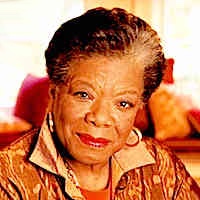
Maya Angelou
1928 – 2014 CE
From a background that included working as a nightclub dancer, fry cook and sex worker; Angelou climbed to becoming the first poet to recite for a Presidential inauguration since Robert Frost. She worked directly with Martin Luther King Jr., Malcolm X, and other Civil Rights leaders, received 50+ honorary degrees, dozens of literary awards, and the Presidential Medal of Freedom. An important spokesperson for women and black people, her books are both subject to bans in libraries as well as being extensively used in universities around the world. “America's most visible black woman autobiographer,” her books and poetry both defended and appreciated Black culture, became a powerful influence on modern hip-hop music, and helped further gender and racial understanding.
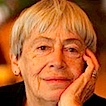
Ursula Le Guin
1929 – 2018 CE
At an early age, Le Guin saw her father making notes in an old book. In this way she discovered Lao Tzu who became a lifelong teacher and companion. Her father, a famous cultural anthropologist also exposed her to the native American shamanistic traditions. This led to a prolific and influential literary career with works translated into 31 languages and winning 21 Locus, 6 Nebula, 5 Hugo, a Newbery and World Fantasy, many “year's best” and other awards. Not just entertaining, these books challenged and positively shaped modern views on race, gender, society and the environment.
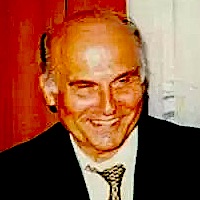
Ryszard Kapuściński
1932 – 2007 CE
“One of the most credible journalists the world has ever seen"
Poet, journalist, photographer, secret service agent, and author; Kapuściński was called ”The master of modern journalism", "Translator of the World,” "The Greatest Reporter in the World", "Herodotus of our times", and "Third World chronicler.” He lived through and reported on 27 revolutions and coups, was jailed 40 times, lost his career-journalism job because of his Polish pro-democracy support, and survived 4 death sentences. “One of the most credible journalists the world has ever seen" and a deep, compassionate thinker; he used innovative literary techniques including “magical journalism” to record his philosophical reflections on decolonization, political corruption, and major world events as well as on their their psychological significance.
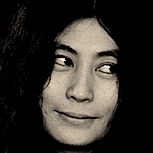
Yoko Ono 小野 洋子 (“Ocean Child”)
1933 CE –
The daughter of one of Japan’s richest banking clans in a long lineage of samurai warrior scholars; Yoko One fell from attending exclusive schools in New York and Japan to begging for food with all the family possessions in a wheelbarrow. A true, faithful life-artist, she collaborated with John Lennon’s public protests against the Viet Nam war, co-wrote ”Give Peace a Chance” inspired many famous songs, and was the only woman to sing a lead vocal on a Beatles’ recording. Continuing her life as “the world's most famous unknown artist,” she’s extended John Lennon’s legacy of political and social activism, philanthropy, and influence on world culture.
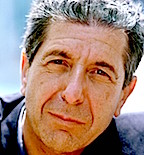
Leonard Cohen
1934 – 2016 CE
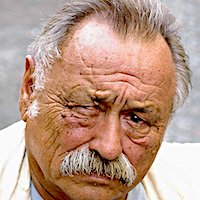
Jim Harrison
1937 – 2016 CE
"untrammeled renegade genius”
Called "an untrammeled renegade genius,” an "American literary icon,” and “a force of nature;” Harrison brought his deep poetic sense to a plethora of novels. An advocate for the benefits of a rural lifestyle, he lived most of his life on a farm in Michigan near where he was born. Most well known for his novels and screenplays like Legend of the Fall, much closer to his heart was his 12+ collections of poetry. Said to have looked like a brick layer, a beer salesman, or a sumo wrestler; he continued the Lao Tzuian, small-is-beautiful lineage of Han Shan, Henry David Thoreau, Willa Cather, and E. F. Schumacher. The superficial details of his life belie the depth of his experience, insight, and wisdom.
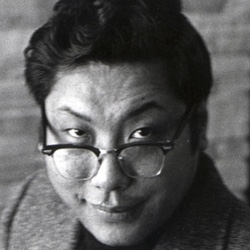
Chögyam Trungpa
1939 – 1987 CE
A once-in-a-generation kind of teacher, a mahasiddha for our times, a transducer transforming ancient wisdom into modern idiom. Per Allen Ginsberg, “A Renaissance man of the highest peaks of East, meditation emperor, space awareness Dance-master, witty rude calligrapher whose poetry and flower arrangements unite the Mind with Body… Prime Minister of Imagination… Chairman of the Board of Directors of Ordinary Mind.” Meditation master, scholar, teacher, poet, artist, he was honored as a mahasiddha by teachers like Khyentse Rinpoche and the 16th Karmapa. “The father of Tibetan Buddhism in the US,” his influence was and remains beyond words.

John Lennon
1940 – 1980 CE
Poet of our age, 20th Century social conscience, inscrutable, uncompromising, brave and outrageous; John Lennon personifies the Lao Tzu lineage and left a lasting and profound impact on the international evolution of consciousness. Uncompromising psychological prophet, he distilled and magnified both our dark side shadows and bright, golden age potentials. Reviled by the Nixon administration and investigated by the FBI, he’s now number 8 on the list of 100 Greatest Britons. Anthem writer for the counterculture and the anti-war movement, reviled by the Nixon administration and investigated by the FBI, he’s now number 8 on the list of 100 Greatest Britons.

Bob Dylan
1941 CE –
Though thought of in many different ways by different people, at heart, Bob Dylan may most essentially represent a modern-day Taoist sage, a continuation of Lao Tzu’s lineage. Awarded the Nobel Prize for Literature in 2016 and called the “Shakespeare of his generation,” he wrote over 500 songs recorded by more than 2000 singers and sold tens of millions of albums. Though world famous for decades and beyond “successful” in numerous ways, his humility and refusal to make a big deal out of himself remains. His music and message transcends his voice and culture. As relevant today as it was in the 60’s, it continues as a major influence on our cultural conscience and consciousness. And this influence shows all signs of continuing far into the future.
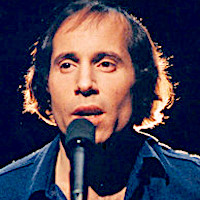
Paul Simon
1941 CE –
Prolific planter of musical, cultural wisdom seeds
One of the world’s most famous singer-songwriters since 1956 and still going strong, Paul Simon’s poetry and music has embedded inner space modules of wisdom in world culture and consciousness. His honors include 16 Grammys, 3 Albums of the Year, a spot on Time magazine’s "100 People Who Shaped the World,” and being listed on both Rolling Stone’s 100 Greatest Guitarists and 100 Greatest Songwriters of All Time. A strong advocate of music education for children, he has mentored many successful musicians and supported the non-profit Children's Health Project, The Children's Health Fund, the Turkana Basin Institute, and Little Kids Rock that provides free musical instruments and lessons for children in public schools. Through all the ups and downs of his careers, he’s continually recreated both himself and his music keeping his creative edge sharp and his social consciousness clear.
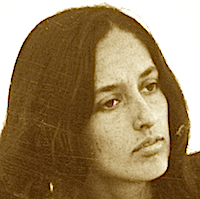
Joan Baez
1941 CE –
Famous but down-to-earth, proud but self-deprecating, a powerful speaker of truth to power; Joan Baez helped launch the civil rights and anti-war movements, social justice on multiple fronts including nonviolence, the environment, and human rights in general. A leader of the dynamic, counterculture social and political change of the sixties, she influenced the direction of American politics and world culture. For 60+ years, recording 30+ albums and songs in 8+ languages; her message of peace, compassion, and justice spread throughout the world both through her own direct example and through her relationship-with impact on people like Bob Dylan, David Harris, and Steve Jobs.
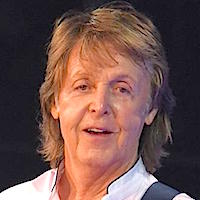
Paul McCartney (Sir James Paul McCartney)
1942 CE –
Described by Ringo star as "pleasantly insincere" and by John Lennon as “all pizza and fairytales,” McCartney sits on the more conservative and conventional side of the art world though this may have helped him avoid the early death pattern so common with famous rock stars. Knighted for his contribution to music and along with Lennon the most celebrated singer-songwriter of our times; McCartney wrote the best-selling Beatles single, "Hey Jude,” one of the most covered songs in modern music’s history, “Yesterday” (2,200+ versions), and wrote or co-wrote music for 60 gold records and 32 songs that became number one hits selling over 100 million singles and 100 million albums. Not stuck in only fame and fortune, he’s worked hard promoting animal rights, poverty alleviation, vegetarianism, and land mine charities.
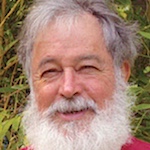
Red Pine ( Bill Porter)
1943 CE –
Exceptional translator, cultural diplomat
Son of a bank robber turned politician who became the wealthy head of the California democratic party, friends with the Kennedys and nominated for president by Eleanor Roosevelt but who later lost everything; Red Pine at an early age saw through the materialism of western culture and left the US for 22 years to study, practice, and translate in the Far East. After studying with John Wu, John Blofeld, and Chiang Kai-Shek’s personal master, Wu Ming, he traveled through Mainland China documenting his adventures with details about Chinese culture and history on over 1100 radio programs for Chinese audiences. His translations sink through the words, find the essence, and bubble the meaning up into beautiful and vivid English.
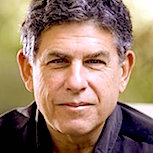
Stephen Mitchell
1943 CE –
Translator, poet, scholar; Mitchell was “educated” at the Sorbonne and Yale, “de-educated” with intensive Zen practice. He’s written fiction, non-fiction, poetry, children’s books and has translated more than 23 books including the Tao Te Ching, Gilgamesh, The Iliad and The Odyssey, the Bhagavad Gita, and the Poetry of Rainer Maria Rilke called “the most beautiful group of poetic translations the 20th century has produced.” Married to Byron Katie, founder of The Work, he coauthored two of her bestselling books: Loving What Is and A Thousand Names for Joy.
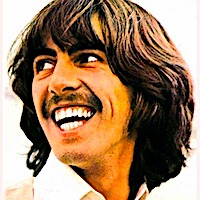
George Harrison
1943 – 2001 CE
Guitar-playing philanthropist
Singer-songwriter, "the quiet Beatle", guitar-playing genius, Hare Krishna fan, Yogananda student, philanthropist, and film producer; George Harrison influenced popular music toward folk rock and introduced Indian culture and music to the West. Two-time Rock and Roll Hall of Fame inductee, he co-founded the Traveling Wilburys, collaborated on songs and music with Bob Dylan, Eric Clapton, Ringo Starr and Tom Petty. Rolling Stone magazine ranked him number 11 in their list of the "100 Greatest Guitarists of All Time.” He supported the civil rights movement, protested against the Vietnam War, supported Greenpeace and nuclear disarmament, recorded pop music's first charity single to support Bangladesh which earned almost $14 million, and established a UNICEF Humanitarian Fund.
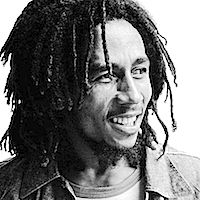
Bob Marley
1945 – 1981 CE
International hero of indigenous communities, one of the greatest song lyricists of all time, Rastafarian, father of at least 11 children with 7 mothers including Miss World Cindy Breakspeare, soccer crusader, and Pan-Africanist; Marley - in the lineage of Che Guevara, the Black Panthers, and Muhammad Ali - promoted political freedom, peace and justice. His song ”One Love" was named song of the millennium by the BBC: and, with sales of over 75 million records, he ranks as one of the world's best-selling artists. He used his spiritually infused music, global popularity, and concerts attended by up to 100,000 people to celescalate independence and justice for minorities, political focus on doing good instead of special interests, and marijuana as a sacrament, spiritual medicine, and catalyst for more wisdom. Awarded the Peace Medal of the Third World from the United Nations, at his funeral the Jamaican Prime Minister said, “Such a man cannot be erased from the mind. He is part of the collective consciousness of our nation” (and now of the world).
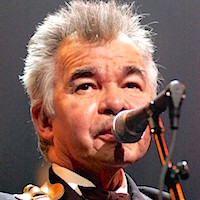
John Prine
1946 CE –
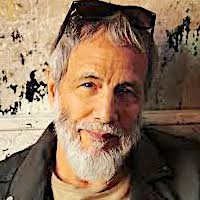
Cat Stevens (Steven Demetre Georgiou, Yusuf Islam)
1948 CE –
Singer-songwriter, musician, humanitarian, and brave artist dedicated to principle over fame and fortune; Cat Stevens had a Greek Orthodox father, a Baptist mother, went to a Catholic school, wrote an album based on a famous Zen teaching, converted to Islam and abandoned his musical career for 30 years. He used his music-derived wealth to promote Muslim philanthropic and educational causes and continues to help famine victims in Africa and thousands of orphans and families in the Balkans, Indonesia, and Iraq. Although always condemning terrorism and Islamic extremism, he was deported by Israel and ironically after the 9/11 attacks while on a tour with Dolly Parton promoting the song Peace Train; he was put on a US No-Fly list, briefly detained, and forced to fly back to the UK. Today he still continues his musical, philanthropic, and peace-making work.
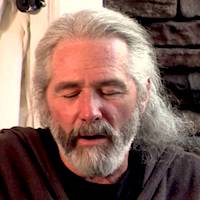
Daniel Ladinsky
1948 CE –
Wisdom lineage poetic channeler
American poet, translator, and interpreter; Ladinsky lived for 20 years in a Meher Baba spiritual community in India while working in free rural health clinics. Basing his work mainly on Rumi and Hafiz, he describes them not as translations but as interpretations and renderings faithful to the spirit though not to the words of these original sources. Frequently licensed and quoted by Christian, Buddhist, Hindu, Jewish, Muslim and Sufi leaders and organizations, and translated into many languages; his books maintain international best-selling status.
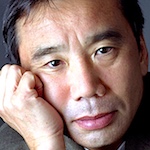
Haruki Murakami
1949 CE –
A “global” writer going beyond his time and culture to explore universal themes, Murakami takes his characters and readers into an inner dreamscape where they together look into the beyond thought world of imagery, perception, and consciousness. Grandson of a Buddhist priest and an Osaka merchant, he became both the most experimental and most popular Japanese novelist translated into English. Called a “voice of his generation,” his books create an allegorical world of magical realism and convey an understanding and appreciation for the vast sacredness of each moment.
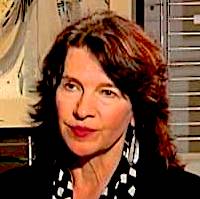
Louise Erdrich
1954 CE –
Chippewa wisdom-storyteller, poet, writer of 15 best-selling novels, Pulitzer Prize finalist, and World Fantasy Award winner; Louise was part of the first class of women admitted to Dartmouth College. A powerful voice for both Native American wisdom and rights, she refused an honorary doctorate from the University of North Dakota because of their Fighting Sioux mascot, wrote a novel about an historical lynching of four Native people based on trumped-up charges, hosts writers' workshops on the Turtle Mountain Indian Reservation, started and runs a “teaching bookstore” that also sells Native American jewelry, art and traditional medicines.
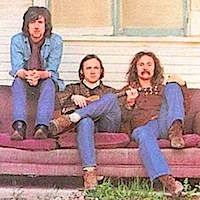
Crosby Stills & Nash
1968 CE –
Related Sources (0 sources)
Quotes about the Poets Lineage (27 quotes)
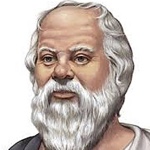
“Not by wisdom do poets write poetry, but by a sort of genius and inspiration.”
Comments: Click to comment

“A poet is someone who can pour light into a cup,
Then raise it to nourish your beautiful parched, holy mouth.”
Comments: Click to comment

“And, as imagination bodies forth
The forms of things unknown, the poet's pen
Turns them to shapes, and gives to airy nothing
A local habitation and a name.”
Comments: Click to comment

“Whatever the poets pretend, it is plain they give immortality to none but themselves; it is Homer and Virgil we reverence and admire, not Achilles or Aeneas. With historians it is quite the contrary; our thoughts are taken up with the actions, persons, and events we read, and we little regard the authors.”
Comments: 1 comment

“The poet brings the whole soul of a man into activity, diffuses a tone and spirit of unity that blends each into each by that magical power we call imagination.”
Comments: Click to comment

“A great poet belongs to no country; his works are public property, and his Memoirs the inheritance of the public.”
Comments: Click to comment

“The poetic mind has no self, no character, no identity; it is every thing and nothing, continually filling some other Body: The Sun, the Moon, the Sea and Men and Women”
Comments: Click to comment
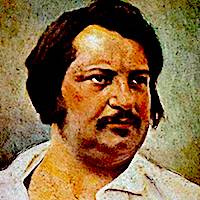
“I'm a great poet. I don't put my poems on paper: they consist of actions and feelings.”
Comments: Click to comment
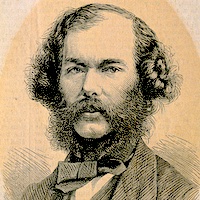
“The discoverer and the poet are inventors; and they are so because their mental vision detects the unapparent, unsuspected facts, almost as vividly as ocular vision rests on the apparent and familiar.”
Comments: Click to comment

“The proof of a poet is that his country absorbs him as affectionately as he has absorbed it.”
Comments: Click to comment

“We read and write poetry because we are members of the human race. And the human race is filled with passion. So medicine, law, business, engineering... these are noble pursuits and necessary to sustain life. But poetry, beauty, romance, love... these are what we stay alive for.”
Comments: Click to comment

“To be a poet is to have a soul so quick to discern that no shade or quality escapes it... a soul in which knowledge passes instantaneously into feeling, and feeling flashes back to a new organ of knowledge... You are a poem, and that is the best part of a poet”
Comments: Click to comment
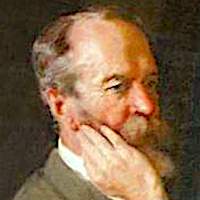
“the true realism, always and everywhere, is that of the poets: to find out where joy resides, and give it a voice far beyond singing. For to miss the joy is to miss all.”
Comments: Click to comment
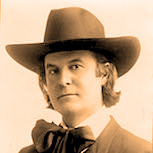
“Most poets die young, not because the gods especially love them, but because life is a bank account and to wipe out our balance is to have your checks bounce. The excesses of youth are drafts payable at maturity.”
Comments: Click to comment
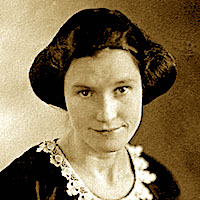
“None but a poet can write a tragedy. For tragedy is nothing less than pain transmuted into exaltation by the alchemy of poetry.”
Comments: Click to comment
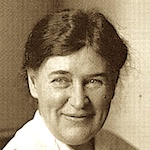
“He squandered too much in the heat of personal communication [and] narrowly missed being a great poet... his bursts of imaginative talk were fatal to his poetic gift.”
Comments: Click to comment

“The ear is the antechamber to the soul and poetry can adulterate more surely than lust or gunpowder. The poet’s then is the highest office of all, His words reach where others fall short”
Comments: Click to comment

“Only supreme artists like Virgil or Horace can produce good verse to governmental specifications; greater men would refuse, lesser men are unable to comply.”
Comments: Click to comment

“No honest poet can ever feel quite sure of the permanent value of what he has written: he may have wasted his time and messed up his life for nothing.”
Comments: Click to comment

“what have poets, in any case, to do with sin? They must dance before the Ark of the Covenant or die!”
Comments: Click to comment
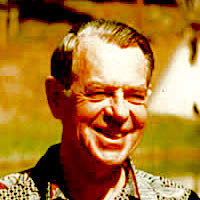
“Poets are simply those who have made a profession and a lifestyle of being in touch with their bliss. Most people are concerned with other things. They get themselves involved in economic and political activities…”
Comments: Click to comment

“Japanese poetry does what poetry does everywhere: it intensifies and exalts experience.”
Comments: Click to comment
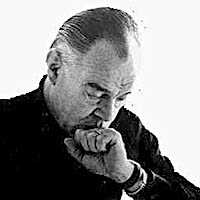
“What stirs lyrical poets to their finest flights is neither the delight of the senses nor the fruitful contentment of the settled couple; not the satisfaction of love, but its passion. And passion means suffering.”
Comments: Click to comment

“A poet is, after all, a sort of scientist, but engaged in a qualitative science in which nothing is measurable... Gauging the fit, he can meticulously place pieces of the universe together, in geometric configurations that are as beautiful and balanced as crystals.”
Comments: Click to comment
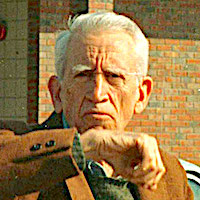
“The true poet has no choice of material. The material plainly chooses him, not he it.”
Comments: Click to comment

“If you're a poet, you do something beautiful. I mean you're supposed to leave something beautiful after you get off the page... It doesn't have to be a poem, for heaven's sake. It may just be some kind of terribly fascinating, syntaxy droppings...”
Comments: Click to comment
Comments (0)